TUESDAY, OCTOBER 14, 2025
Governor: Bahamians fully covered on banking failures
By NEIL HARTNELL Tribune Business Editor
THE Central Bank’s governor says planned legal reforms will boost Bahamian consumer confidence that they will receive “swift payouts of all insured deposits” should their bank collapse into insolvency.
John Rolle, in a series of e-mailed replies to Tribune Business questions, revealed that proposed changes to the Protection of Depositors Act will create “dedicated back-up funding” for the Deposit Insurance Corporation and provide it with “greater liquidity” should it ever be called upon to compensate Bahamians if their banking institution fails and they are unable to access their money.
He added that the “back-up” regime, besides ensuring rapid payouts of all insured deposits, will also prevent the Deposit Insurance Corporation from “exhausting” reserves that stood at $101.5m at year-end 2024. Its creation will thus generate an added layer of protection that gives Bahamian depositors greater confidence there financial well-being is protected should the worst occur.
“Establishing a back-up funding regime for the deposit insurance
scheme is confidence-enhancing domestic financial stability,” Mr Rolle told this newspaper. “This provides assurances that the Deposit Insurance Corporation will be able to make all payouts of insured deposits swiftlywithout running short of liquidity and without exhausting the Deposit Insurance Fund in any single payout.
“At all times, the Deposit Insurance Corporation also needs to be able to maintain positive reserves, even ever after claims payouts. Having back-up funding satisfies this requirement. Of course, by law the Deposit Insurance Corporation would be able to levy an assessment on the member institutions to repay any borrowed resources.”
The Central Bank, in unveiling its regulatory reforms package, said the changes were designed “to strengthen the framework and operational capacity of the Deposit Insurance Corporation (DIC) by ensuring that Bahamian depositors are always protected, irrespective of the financial balance in the Corporation’s fund”.
It reiterated: “This will facilitate
confidence in financial institutions, the absence of which may lead to preemptive runs on weak but otherwise solvent institutions. To achieve this, the draft legislation would make provision for the Corporation to have access to a dedicated, pre-arranged back-up funding arrangement with the Central Bank that is sufficient to meet liquidity needs.
“These emergency funds would be supported by government guarantees and repaid to the Central Bank.” Section 15 in the Protection of Depositors Act is to be changed to establish an emergency back-up funding facility financed by funds borrowed from the Central Bank and guaranteed by the Government.
The Central Bank governor, explaining the intent by the planned changes to the Act and its accompanying regulations, told Tribune Business: “Reforms to the deposit insurance regime, and for the Deposit Insurance Corporation (DIC), would
NAD ‘HOISTED BY OWN PETARD’ OVER POLITICAL FIRESTORM LEASE
By NEIL HARTNELL Tribune Business Editor nhartnell@tribunemedia.net
NASSAU Airport Development Company (NAD) violated its duty to deal “in good faith” with a prominent businesswoman over renewing a restaurant lease formerly embroiled in a political firestorm.
Justice Loren Klein, in a September 28, 2025, verdict awarded Patricia Mortimer and her Patmor Group of Companies unspecified damages after finding that Lynden Pindling International Airport’s (LPIA) operator was “hoisted by their petards” over how it handled negotiations for the renewal of one of the
three leases she held. However, he refused to issue an Order for “specific performance” mandating that NAD consider extending the disputed lease and declared that “there is no clear victor in this matter”.
And, while Justice Klein granted Ms Mortimer and her companies a temporary injunction “to prevent interference” with the lease prior to a full trial, he suggested this was moot because the two sides are still negotiating. The judge also declined Ms Mortimer’s request for a declaration that the April 1, 2007, “transfer agreement”, which saw the Airport Authority transfer operational responsibility
for LPIA to NAD, was illegal or invalid “as this has not been established as a matter of fact or law”. He added that she was not able to seek such a declaration based on her case before the Supreme Court.
As to the disputed lease, Justice Klein found that NAD’s defence was based on terms that were overridden - and replaced - by a deed of settlement that it agreed with Ms Mortimer and her companies on March 3, 2017, to address the multi-million dollar rental arrears that the latter had accumulated on their retail and restaurant operations in the US departures terminal.
By NEIL HARTNELL Tribune Business Editor
A PROMINENT attorney is calling for the Grand Bahama Port Authority and its affiliates to guarantee the Taino Beach bridge’s rebuilding by posting a bond due to their “less than stellar” upkeep of Freeport.
Terence Gape, a Freeport-based partner at the Dupuch & Turnquest law firm, in an October 10, 2025, letter argued that the bridge’s fate represents “a litmus test” of whether the city’s quasigovernmental authority and its affiliates have the financial and administrative capacity to fulfill their Hawksbill Creek Agreement obligations to properly maintain the Port area and its infrastructure.
Writing to Charisse Brown, chief executive of both the Grand Bahama
Development Company (DevCO) and Lucaya Service Company (LUSCO), he cited the “abdication” of the Grand Bahama Port Authority’s (GBPA) responsibility for the island’s airport, and the condition of Freeport’s roads, bridges, waterways, canal entrances and water supply, to back his argument it has “been neglecting their duty”.
And, signalling his backing for the Davis administration’s arbitration push as a means to make the Port area “administratively a part of The Bahamas once again, Mr Gape asserted that Freeport and Grand Bahama “remain the last chance for significant economic growth in the country for the short and long-term given [their] available infrastructure and land mass”.
The well-known legal advocate, in a letter
ABACO PORT’S WORK LAUNCH TO END ‘OVER-SHADOWING THREAT’
By NEIL HARTNELL Tribune Business Editor nhartnell@tribunemedia.net
AN EX-ABACO Chamber of Commerce chief is hailing as “about bloody time” today’s promised start on upgrades to Marsh Harbour’s port given the “threat over-shadowing our existence”.
Daphne DeGregoryMiaoulis, speaking after the Ministry of Energy and Transport yesterday announced its partnership with the US embassy will see improvements to the commercial shipping facility begin today, told Tribune Business the work is critical to bringing it into compliance with international regulations and preventing Abaco from being “cut-off”. This was also acknowledged by Jobeth Coleby-Davis, minister of energy and transport, who voiced optimism that teaming with the Nassaubased embassy and US government “will help us achieve full compliance with International Ship and Port Facility (ISPS) measures” that were introduced worldwide following the September 11, 2001, terror attacks. Tribune Business previously revealed the Marsh Harbour port was struggling to comply with the ISPS regime in 2018, even before Hurricane Dorian
GRID OPERATOR TARGETING STAFF QUADRUPLE TO 150 IN TWO YEARS
By NEIL HARTNELL Tribune Business Editor
nhartnell@tribunemedia.net
THE company formed to overhaul New Providence’s energy grid is aiming to ramp up to a 150-strong workforce within the next two years as it bids to construct its headquarters complex by 2027.
Bahamas Grid Company, in e-mailed replies to Tribune Business questions, said it plans to ultimately near-quadruple its existing workforce having filled 40 posts during its first six months in operation with Bahamian staff accounting for just under two-thirds or 63 percent of those employed.
“Bahamas Grid Company has created and filled over 40 jobs with a planned workforce of 150 within the next 18-24 months,” the majority private-owned special purpose vehicle (SPV), which has been financed by a
$130m mix of debt and equity funding, revealed.
The company, which has an initial 25-year deal to manage and upgrade New Providence’s electricity grid, added that it plans to establish a permanent head office in south-west New Providence over the next two years.
“The current Bahamas Grid Company office is located on the west side of New Providence, and it is a temporary space. Bahamas Grid Company is in the process of building a new headquarters on Frank Watson Boulevard, slated for completion in 2027,” the transmission and distribution (T&D) manager disclosed.
Then, clarifying its relationship with Pike Electrical, Bahamas Grid Company said the North Carolina-based electrical services provider is “a subcontractor” supporting it on the first phase $130m New Providence grid upgrade. It has also been tasked with training Bahamas Grid Company
staff, including what it described as a “first for The Bahamas” - having local line workers work on live lines.
“Pike is a sub-contractor that supports Bahamas Grid Company on the foundational grid upgrade project, and assists with maintenance and restoration efforts while also training local staff to eventually take over the job,” Bahamas Grid Company confirmed.
“Our goal is to train up a team of local line workers who can do work on energised power lines, which will be a first for The Bahamas. Being able to work on energised power lines means that New Providence will have far fewer planned outages in the future, and maintenance times will be drastically reduced.
“This is one of the skill sets that Pike has brought to the island, and is currently teaching young local workers to
devastated the island and its major commercial shipping facility, and failure to meet these standards and pass the necessary inspections would result in US cargo vessels being barred from bringing goods directly to Abaco.
The island’s private sector has long voiced fears that the failure to properly repair, and enhance, security and overall operations at the port post-Dorian has left Abaco exposed to such an outcome any moment. Should direct shipping be cut-off, businesses would be forced to import via Nassau and/or Freeport, adding further expense to already-high living costs


Downtown fears linger over Royal Caribbean’s PI project
By ANNELIA NIXON
RETAILERS and straw vendors still fear “downtown is going to die” as a result of Royal Caribbean’s Paradise Island beach club despite assurances it will generate more business for all.
The cruise line’s annual Nassau passenger volumes are forecast to increase from the current 1.8m to four million over the next two years, leading Michael Maura, Nassau Cruise Port’s chief executive, to recently tell this newspaper that there will be sufficient visitor numbers for all who rely on the cruise industry for their livelihoods. And, of that four million, only one million will head to the Beach Club.
Others, though, are not so convinced. Cincinetti Hall, owner of All Things Straw, argued that Royal Caribbean passengers will be directly transported to Paradise Island and likely only leave to return to their ship, leaving no time for shopping at downtown businesses.
“I grew up in the downtown area Straw Market,
besides even being in tourism for many, many years,” Ms Hall said. “The thing is, with that, persons are literally going to go directly from the cruise port on to that island.
“They shut down at a certain time, which is normally the timeframe that the tourist is going to be preparing to head back to the ship, prepare for captain’s dinners, so on, so forth. Downtown is going to die. That’s a fact.
“They’re going directly from the cruise, and they’re on that island, and they’re paying to be there. So, of course they’re going to take advantage of being there all day. They’re not going to leave that island to say, head back into town to go look for souvenirs, which is at every port that they are going to stop. So downtown will for sure suffer.”
Ms Hall said cruise passengers do not make as big a contribution to the Bahamian economy as land-based visitors. “And, you know, cruise ship passengers are looking for $10 and $15 gifts,” she added. “To be honest with you, the average cruise ship passenger, they don’t pour into the
economy. They don’t spend unless they get two for $10 key chains maybe.
“Downtown is going to suffer because there’s nothing being channelled through the downtown area in reference to transit there. It’s going directly from the cruise port. That alone was a red flag... And it’s not like the taxi drivers are getting the funds. They literally do ferry boats; their own ferry boats. So it’s not even the ferry boat guys or other other ferry boat vendors or so on. So that’s a no brainer. Downtown is going to feel it.”
Soon to make her move into the downtown Nassau area, Ms Hall said she has established customers and will not have to rely solely on cruise ship passengers. “The thing about me is I do online marketing, and I have my clientele,” Ms Hall said. “I do what I have to do, but downtown is going to feel it for sure because the persons go directly there.
“Even in the cruise port... Persons there are channel travelling just to get to the beach, or just to get to Long Wharf or Arawak Cay, or wherever they’re
headed, and that’s it - to their excursion, so on so forth. That’s like persons going Blue Lagoon, same thing. They head to these destinations or these excursions. When they get back, they go straight back on to the cruise and prepare for dinner.
“I have a lot of locals as well as expats that patronise my business. Then I also have guests visiting from out of town, whether it be they’re staying at Baha Mar, at Atlantis, they tend to visit our shop. So our shop is going to be accessible to everyone by being at that location…”
Deidre Palacious, a vendor at the downtown Straw Market, said there has already been a significant slow down in the number of tourists shopping. She said vendors who sell authentic and handmade items are seeing less sales because tourists lately have been purchasing more imported items.
“All I can say, I guess, is we have an impact now because of all the other souveniur stores that are open downtown,” Ms Palacious said. “So it’s impacting us a lot now. And the, they’re
taking the tourists off the boats, and they are taking them on excursion tours.
“And when they bring them back, it’s time for them to be on the boat. So they don’t even have time to shop, some of them. And it depends on what you’re selling. I’m selling authentic straw. Most of my stuff on my booth is hand-mad, and a little souveniur here and there from nowhere.
“A lot of the tourists are buying more of the things that are being brought in.
So, the persons who really doing the straw work are more affected than those who adding other stuff and selling it to make money. I mean, they have to pay the bills, but I’m just one of those who wants to stick to being original,” she added.
“You’ll have some tourists, depending on what you bring in, persons from different countries, some of them are looking for different and some are looking for the things that they can get from the other countries where they visit on the boat.
“So it’s affecting me and others who selling straw, and I’m sure it’s affecting other persons. But people
selling the clothes and the bags that are not made here and stuff like that, they are selling more than the authentic things that are made here.”
Ms Palacious suggested the cruise ships promote the Bay Street Straw Market more in order to drive more foot traffic into the downtown area. “I feel they need to promote the straw market on the cruise ship more, because a lot of persons, they march straight down to Junkanoo Beach,” she said. “So they are making the money. So they promote Junkanoo Beach.
“So any given day you pass, you’ll see the tourist just marching. I know they have to go to the beach. But, they always ask: ‘Where’s Junkanoo Beach?’ So it’s like they’re promoting more of the beach than the market.
“And then, two, our straw market is hot. We don’t have blowers and coolers, and so when the tourists come in, they get hot. And some be frustrated and feel faint, and they just want to get out. So all that could contribute to them not being in the market, taking their time to shop.”
STRONGER QUALITY PROTECTION MORE IMPORTANT MEDICINE THAN TARIFFS
EDITOR, The Tribune.
I READ with great interest your recent article, ‘Bahamas’ double-edged sword over medications’, which featured comments from Dr Marvin Smith and Dr Duane Sands. While Dr Smith raised valid points regarding the potential impact of the Trump administration’s pharmaceutical tariffs on drug costs and availability, I would like to offer a broader perspective on how these dynamics affect the Bahamian market. As it stands, manufacturerauthorised distributors in The Bahamas source branded medications directly from respective manufacturers. These products typically enter our market through supply chains based in Central America, not in the US. Other wholesalers, who do not hold distribution rights for particular brands, often obtain their supplies from the United Kingdom, other European countries such as Germany or Spain, or from
Turkey. This sourcing pattern is intentional: Branded pharmaceuticals from the US are generally far more expensive than those obtained from European, Latin American and Asian markets.
Therefore, any tariffrelated price increases in the US are unlikely to have a major or immediate impact on the Bahamian pharmaceutical brand market, as most of these products are not sourced from the US. The few exceptions tend to be newly-approved specialty drugs - those cleared by the Food and Drug Administration (FDA) within the past 18 to 24 months - that have not yet reached global distribution. These are usually sought only by a small percentage of patients who can afford such high-cost therapies. In most cases, suitable alternatives already exist within our region.
That said, the larger concern for The Bahamas lies not in the cost of US imports but in the quality control of pharmaceuticals entering
our borders. The Bahamas is a non-registration market, meaning that any licensed pharmacy or wholesaler may import and sell pharmaceuticals without local product registration or batch testing. This regulatory gap creates opportunities for sub-standard or counterfeit medications (brand or generic) to enter the market, posing potential risks to public health.
While Dr Smith correctly notes that the majority of the world’s pharmaceuticals are manufactured in Asia, it is important to emphasise that countries such as the US, the UK and European Union (EU) members, along with registration-led Caribbean nations such as Jamaica and Trinidad, have systems in place to safeguard and verify the quality of products before release to the public. The Bahamas, lacking such infrastructure, relies heavily on these regulated markets to ensure product quality.
Dr Smith also referenced manufacturers certified by
the World Health Organisation (WHO), which is certainly a step in the right direction. However, our lack of infrastructure to test products locally still leaves a gap in quality assurance. WHO Good Manufacturing Practice (GMP) certifications are typically issued every three years and, in some countries, every five. Without local verification of incoming batches from non-stringent markets, we risk receiving an initial highquality shipment followed by sub-standard batches thereafter. This underscores the need for proper safeguards, including a pharmacovigilance department, a drug registration system and a local testing facility. It is also important that conversations like these involve the actual importers and distributors who manage the pharmaceutical supply chain. These are the individuals and companies best positioned to determine whether the tariffs will have a meaningful impact and to collaborate
on practical, proactive solutions. Regular dialogue and brainstorming among regulators, healthcare professionals and importers could help ensure the stability, safety and affordability of our national drug supply.
Before we focus on fears of rising prices or turn hastily toward unverified generic alternatives, The Bahamas must first establish stronger pharmaceutical safeguards. Specifically, we need:
• A pharmacovigilance department capable of conducting root-cause analyses, investigating complaints and monitoring the safety of imported medications.
• A drug registration system that requires all products entering the market to be approved and traceable.
• A testing facility to verify product quality through random testing and detect counterfeit or substandard drugs.
At a minimum, while relying on approvals from stringent regulatory
authorities like the US and Canada, we should prioritise enhancing the integrity of our drug importation process in The Bahamas. This can be achieved by requiring licensed wholesalers to provide comprehensive documentation that verifies the authenticity and quality of their imports, whether brand or generic. Government oversight should include robust supply chain controls, verification of product authenticity and quality, and maintenance of auditable records. By enforcing proper standards, we can mitigate the risks of falsified or sub-standard products and safeguard public health. These measures, combined with open collaboration among all stakeholders, would ensure that Bahamians receive safe, effective and affordable medications regardless of international trade shifts.
Sincerely A PHARMACIST
ORLANDO HOSPITALITY GROUP TEAMS WITH CAPO IN BIMINI DEVELOPMENT
AN ORLANDOHEADQUARTERED hospitality group has teamed with Gerardo Capo’s RAV Bahamas to invest in the latter’s Banyan Tree Bimini Resort & Residences project on Rockwell
Island. Westgate Resorts, which bills itself as the “largest privately-held

timeshare resort club in the world” with a portfolio of more than 60 resort properties, said in a statement that it has been joined in the development by Gissy Family Investments and other partner investors.
The Banyan Treebranded project mixes high-end homes with 80 to 120-foot docks in the back bay. Rockwell Island will include an 18-hole golf course, a boutique hotel and a nature preserve.
“This new strategic investment marks an exciting milestone for Westgate as we expand our
capabilities as a company,” said Jim Gissy, chief executive at Westgate Resorts and chair of Gissy Family Investments.
“Our investment in the Banyan Tree Bimini Resort & Residences reflects our confidence in the long-term growth of The Bahamas, our deep friendship with Gerardo Capo and his family, and our commitment to creating exceptional travel experiences. We see this as the first step in unlocking new opportunities in one of the world’s most desirable destinations.” Westgate’s investment marks its first venture in
The Bahamas, with the group asserting that the move sets the stage for future opportunities in the Caribbean market.
“As we look to expand Westgate, we are excited by the opportunities we see within vacation ownership, but also in those businesses that complement it – hotel development, real estate and strategic investment partnerships,” said Jared Saft, Westgate’s chief business and strategy officer.
“Westgate continues to forge ahead with groundbreaking initiatives and partnerships across the leisure travel industry.”
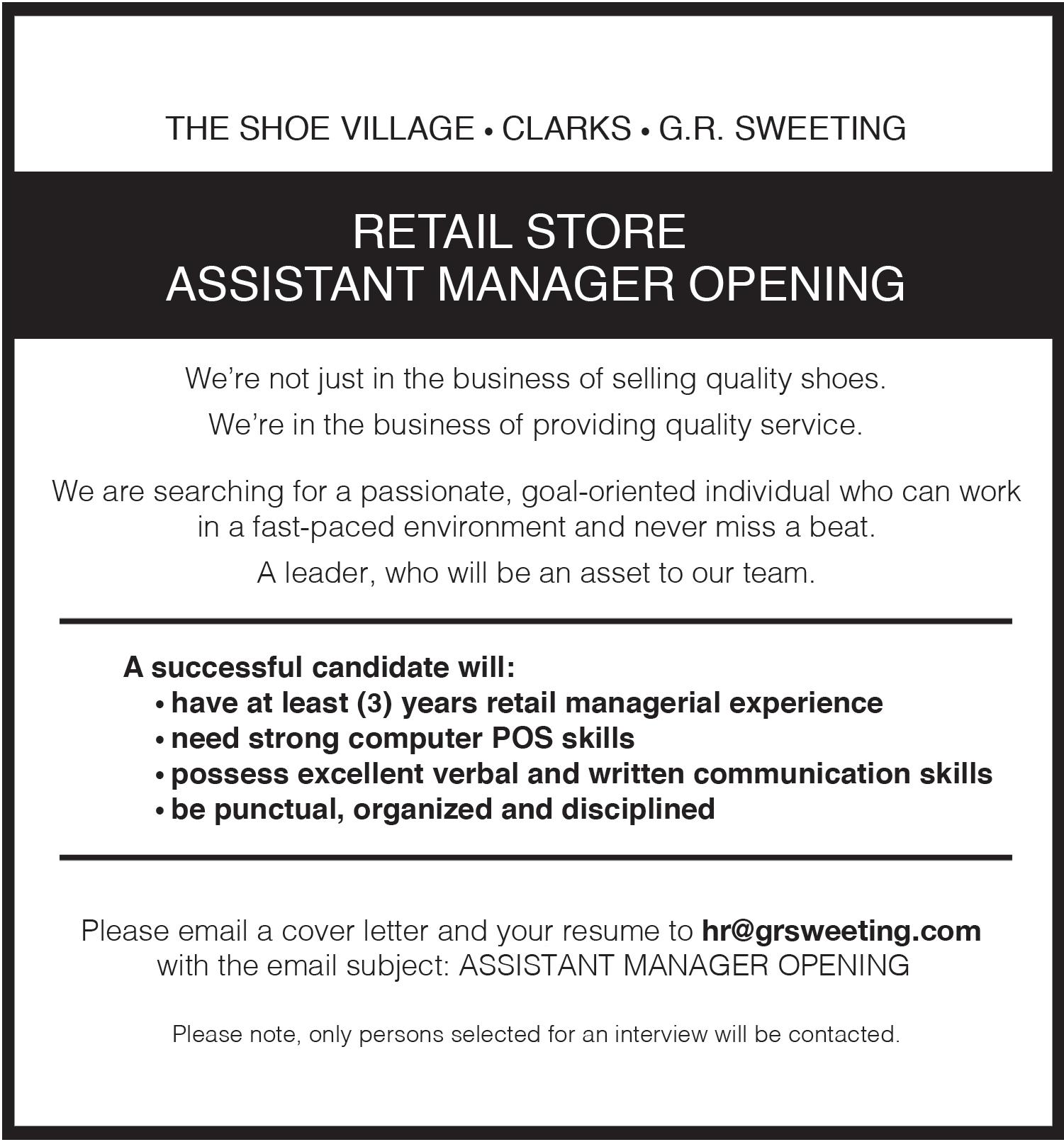
PM CANCELS UNION MEETING OVER ‘NATIONAL STRIKE’ THREAT
By FAY
The Prime Minister yesterday cancelled today’s follow-up meeting over the public sector salary review after a union leader threatened “a national strike” unless their pay demands were met.
Philip Davis KC, in a statement, pledged to “speak directly to the Bahamian people” while hinting that the unions are not negotiating in good faith after Belinda Wilson, the Bahamas Union of Teachers (BUT) president, threatened renewed industrial action tomorrow unless salary increments for junior, line staff teachers and civil servants were made retroactive to September 2024.
Those increments, at present, are due to be seen and felt in junior civil servants’ pay cheques come December 2025 but only made retroactive to September 2025. Ms Wilson, though, asserted that making them retroactive to September 2024 would ensure junior public officials were treated equally with their middle management counterparts.
Speaking after she and Kimsley Ferguson, the Bahamas Public Services Union (BPSU) president, met with the Prime Minister yesterday, Mrs Wilson confirmed union representatives received a copy of the public sector salary review, which only covered middle managers and above, but said the same calculation method will be applied to determine raises for all public servants.
“First on our agenda was
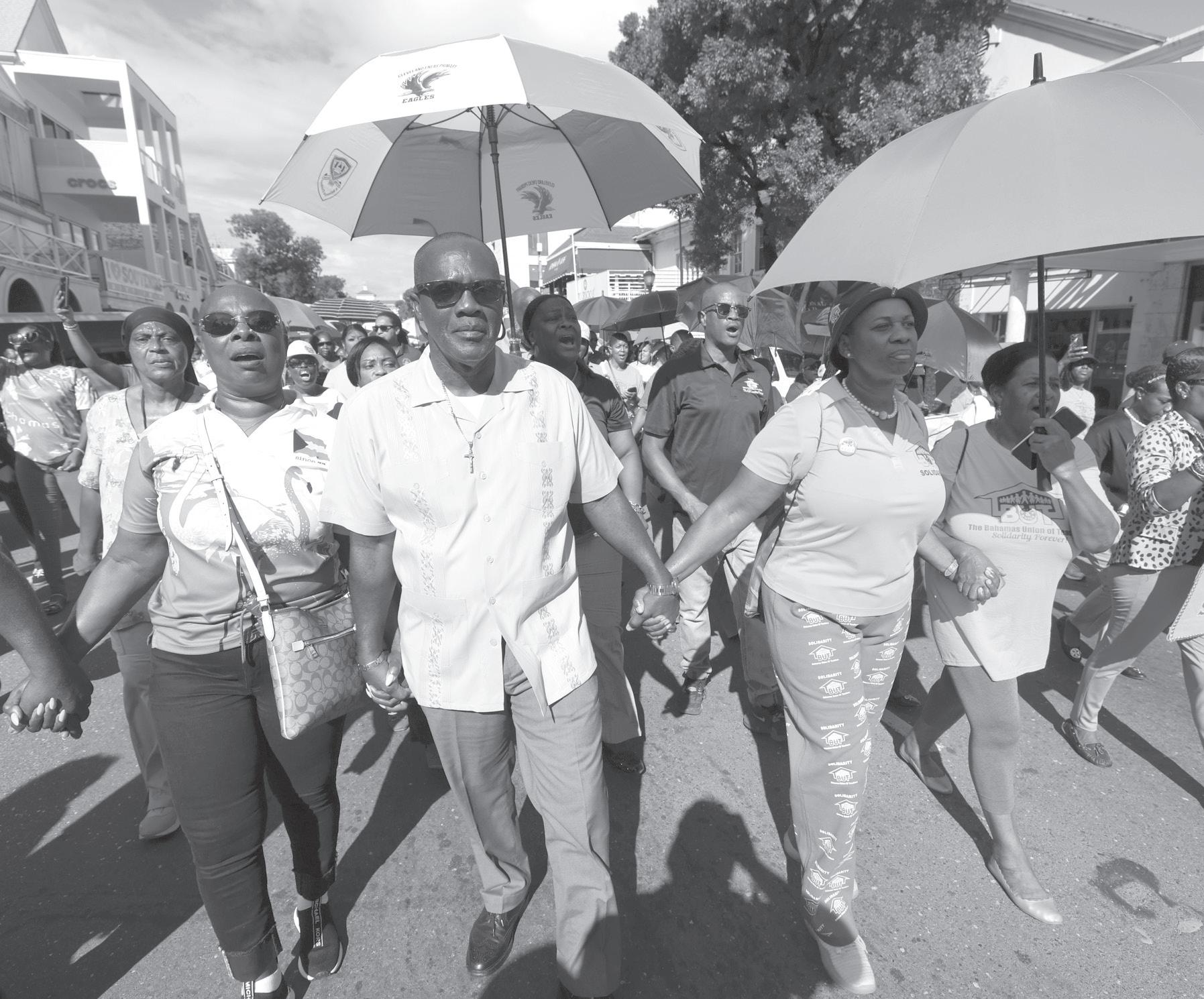
the salary review report, which we received. Please note that the salary review only included middle managers and up. However, the same method used to calculate the salaries for the middle managers and up will be used to calculate all public servants’ increases, including teachers,” said Mrs Wilson. She said public workers are requesting to be paid retroactive to September 2024, and to receive these funds during the October pay period which is now just two weeks’ away. “We requested that all public servants, inclusive of teachers, be paid retroactive to September 2024 just like the middle managers and up, and that the payments
be made October 2025 payday,” said Mrs Wilson.
Union officials were expected to continue discussions with the Prime Minister today, but Mrs Wilson then threatened that if union demands were not met, members would again protest outside Parliament this Wednesday, as well as at the Office of the Prime Minister in Grand Bahama, with Family Island members remaining at home and not reporting to work.
“If the Tuesday, October 14, 2025, meeting does not yield the results that you, the members, told us that you desire, then we will assemble Wednesday, October 15, 2025, at City Market on Market Street at 9am; at the Office of the Prime

threatening a national strike and requesting a further meeting tomorrow at 1pm,” the Prime Minister said.
“After careful consideration, I have decided not to proceed with that meeting. Instead, I will speak directly to the Bahamian people and to the workers of this nation, the men and women whose effort, care and service form the backbone of our country.”
During his 2025/-2026
Budget communication, Mr Davis announced middle management public servants would receive salary increases at the end of June and there would be broader pay rises of between 2 to 8 percent for the rest of the public service coming in September, along with expanded health insurance coverage for all government employees.
Minister in Freeport, Grand Bahama, and all Family Islands - from Abaco to Inagua - will be asked to remain at home if we have to give the green light for the industrial action on Wednesday, October 15 2025, so stay tuned,” said Mrs Wilson.
In response, Mr Davis cancelled the meeting scheduled with union officials. “Following that meeting [yesterday], the president of the Bahamas Union of Teachers made a public statement
However, it was announced last month that public servants who missed earlier pay rises would now receive them in December, not in September as previously planned. The Government advised increases will be retroactive to September, with each employee receiving at least two salary increments, though the size of the increases will vary by civil service worker category.
Members of the BUT and BPSU last week marched to Parliament demanding clarity on delayed salary increases that were initially promised in September,
expressing frustration over what they described as a lack of follow-through by the Government.
Mr Davis, meanwhile, has confirmed that the salary review for public workers has been completed and will be released to the public. Speaking yesterday’s meeting, Mr Davis said the review was initiated to “make life better” for government employees and assured that, once finalised, it would be made public.
“This review was not done at the request of any union; it was done because my government believes Bahamian workers deserve better. We wanted to look carefully and independently at how salaries across the public service can be made fairer and more reflective of the value of the work you do,” said Mr Davis.
“I can now confirm that we will make that review public. Bahamians deserve to see for themselves the effort that has gone into ensuring fairness and equity in how we reward those who serve.” Mr Davis also reaffirmed his commitment to making payments to public workers “before Christmas”.
“If the question is one of payment, let me say again: Every public servant will be paid before Christmas. The Ministry of Finance and the Treasury have been working to ensure this, and I am satisfied that they are on course to deliver,” he added.
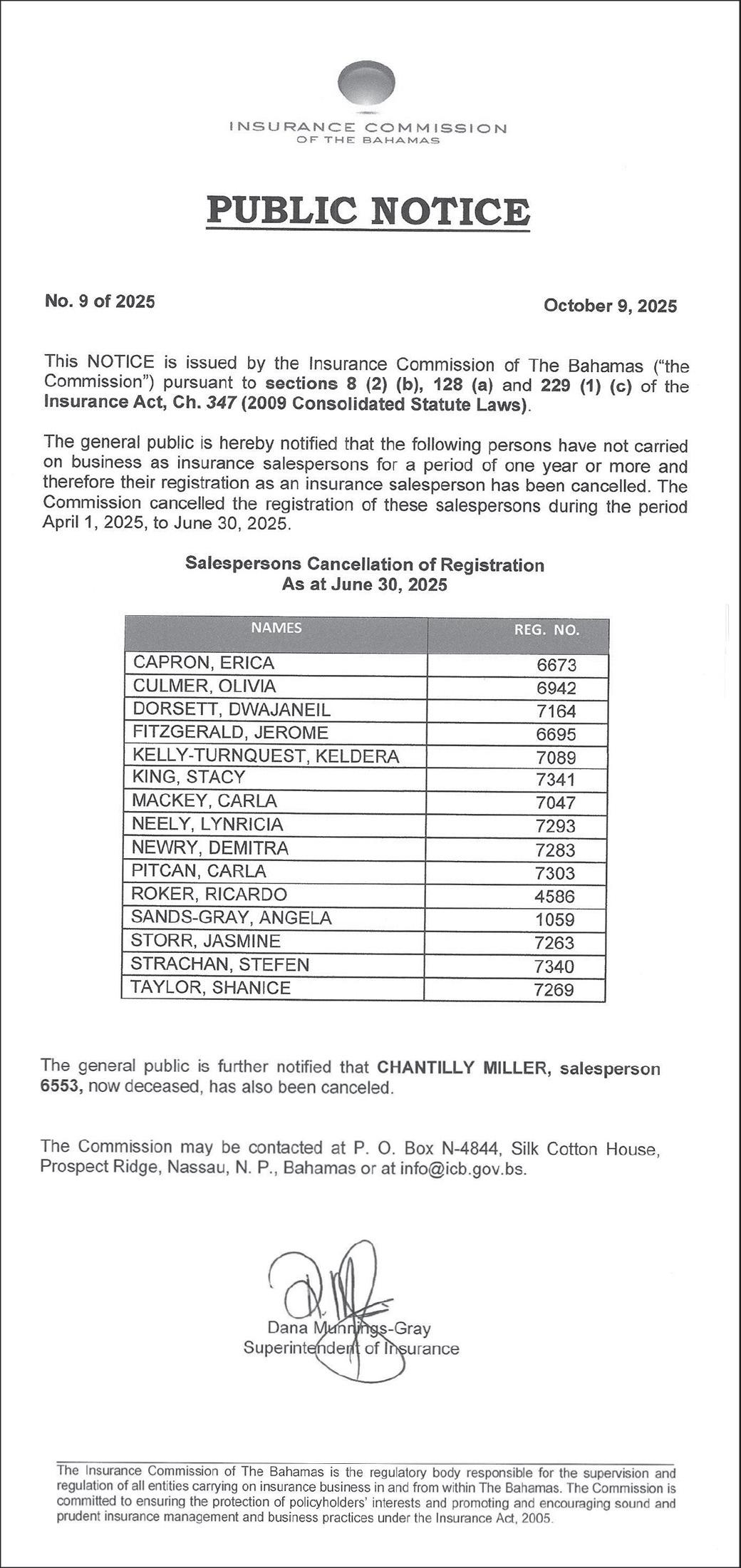
UNION ‘GOING TO DO SOMETHING’ OVER STAFF GRIEVANCES AT BAIC
By ANNELIA NIXON Tribune Business Reporter
A TRADE union says it is plotting its next move with grievances over the alleged non-payment of salary increments for Bahamas Agricultural and Industrial Corporation (BAIC) staff yet to be addressed.
Linda Sands, the Bahamas General Workers Union’s (BGWU), said only half the promised salary increments were paid with the last occurring in 2022-2023. “Why can some people have and some not have?” she challenged. “You’re saying
to us that BAIC is quasi (government).
“It doesn’t matter, because when they want BAIC staff to be quasi, they push them to the quasi side. When they want them to be government, they bring them over to the Government side. If you have already made the first payment, why have you not sent the balance of the money?... Have a meeting and pay BAIC staff.” Ms Sands said the BGWU has reached out to the Ministry of Finance “more than five times” on the issue. After receiving no reply, it then contacted the Prime Minister’s Office. Ms Sands said the union spoke with
Latrae Rahming, the Prime Minister’s communications director, who said Philip Davis KC had reassured he will pay the increments owed at BAIC.
“But since then, that’s about three, four weeks ago. Nothing has happened either,” she asserted. “We’re in the planning process. We’re going to do something. We don’t want to say right now, but yes, we are in the planning process.”
Natania Johnson, the BGWU’s secretary-general, cited a number of outstanding concerns for the union and its members including mould infestation in several Family Island packing houses and overdue
promotions for those not at the executive level.
“We have non-payment of persons who would have done extra duties when our industrial agreement speaks to that,” Ms Johnson added. “So if someone works and they do extra duties, they should be compensated. And that’s in our industrial agreement.
“However, you have persons who would have been operating in a more senior position, senior capacity, and have not been compensated. You have non-payment of increment. To-date you have persons who have breached their incremental period, the incremental date, and they
have not been paid their increment.
“We have an excessive shortage of janitorial staff. We had 12 people working as a janitress. The Corporation released four who were on contract. We were fighting for them to bring those contract workers back, and they adamantly denied bringing those contract workers back. We had one that was ousted. She’s since passed away. God rest the dead. And so we are down now to approximately five janitorial staff when we had 12,” Ms Johnson said.
“So you have persons now who are taking on an excessive load of work due to the shortage. And it’s
not that the Corporation cannot assist or provide the help. We’ve asked, we’ve written, we went to the Labour Department, and they still refuse to hire more janitorial staff to absorb the workload on these mothers who have to go home to their kids and their family, and still be able to perform.
“You have persons who have back issues who work in the department, who have hand issues, leg issues. These are janitorial workers who cannot fully work to the full capacity that they need due to these injuries. But, then again, you’re adding more workload to these individuals. It’s unfair.”
JPMORGAN TO INVEST UP TO $10 BILLION IN US COMPANIES WITH CRUCIAL TIES TO NATIONAL SECURITY
By MICHELLE CHAPMAN AP Business Writer
JPMORGAN Chase will directly invest up to $10 billion in US companies
with crucial ties to national security. The investment plan revealed on Monday will focus on four areas: supply chain and
advanced manufacturing in critical minerals, pharmaceutical precursors and robotics; defense and aerospace; energy independence, with investments


in battery storage and grid resilience; and strategic technologies, including artificial intelligence, cybersecurity and quantum computing.
The investment is part of the bank’s Security and Resiliency Initiative, a $1.5 trillion, 10-year plan to facilitate, finance and invest in industries critical to national security.
“It has become painfully clear that the United States has allowed itself to become too reliant on unreliable sources of critical minerals, products and manufacturing – all of
which are essential for our national security,” Chairman and CEO Jamie Dimon said in a statement. “Our security is predicated on the strength and resiliency of America’s economy. America needs more speed and investment.”
This summer, JPMorgan helped put together a deal under which the Defense Department agreed to invest $400 million in US rare earth company MP Materials. The bank is also providing financing for MP Materials’ second magnet producing factory in the US.
The nation’s largest bank plans to finance approximately $1 trillion over the next decade in support of clients in these industries. JPMorgan Chase is looking to increase this amount by up to $500 billion, or a 50% increase, with additional resources and capital.
“America needs more speed and investment,” Dimon said. “It also needs to remove obstacles that stand in the way: excessive regulations, bureaucratic delay, partisan gridlock and an education system not aligned to the skills we need.”
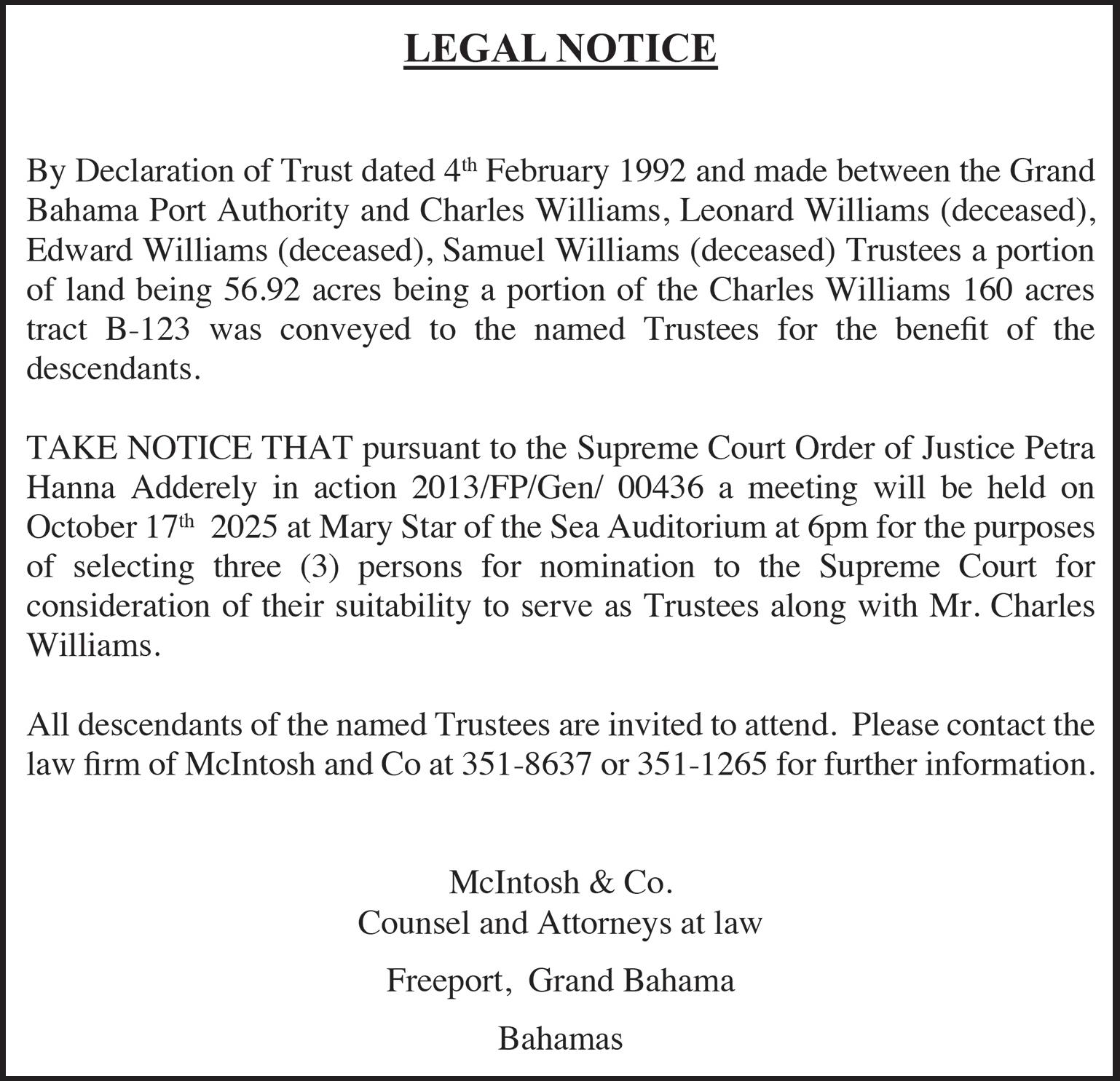
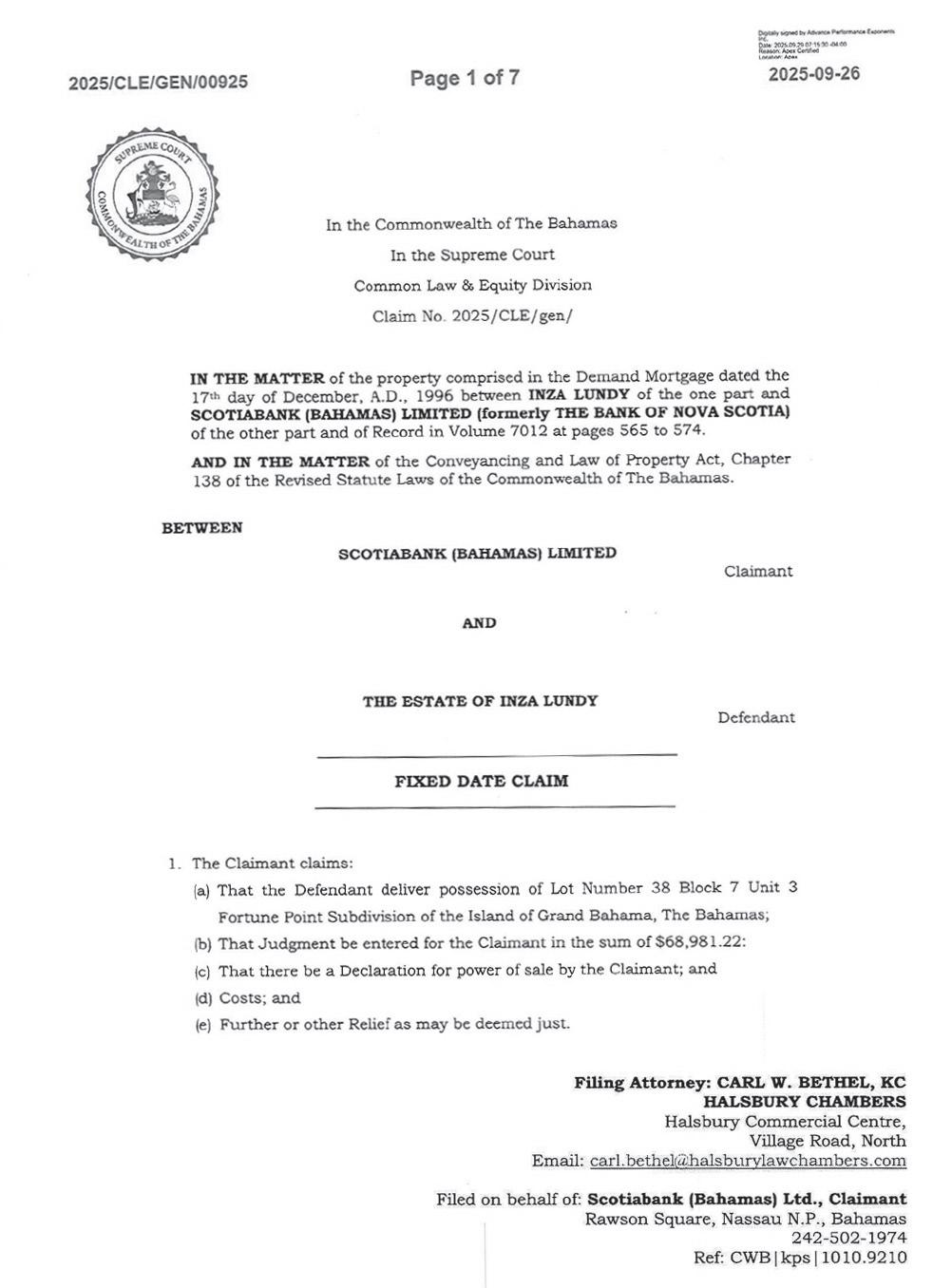
REPAIRS GBPA ‘LITMUS TEST’ ON FREEPORT INFRASTRUCTURE
seen by Tribune Business, raised multiple questions over LUSCO’s joint plans with Tamarind (Grand Bahama) Development for Bahamas Hot Mix to construct a “temporary limestone causeway” running alongside, and parallel to, the deteriorating Taino Beach bridge so as to provide businesses and residents with continued access to areas such as Smith’s Point.
Writing on behalf of Taino Beach Ltd, owner and developer of the Taino Beach Resort, plus the Bell Channel Club, residents of Smith’s Point, and the lot, home and condo owners that Dupuch & Turnquest represents on Taino Beach Island, Mr Gape noted that he had written to the GBPA more than a year ago over the bridge’s “questionable integrity”.
Pointing out that his August 14, 2024, letter had also warned about “the danger to the safety of persons” using the bridge, he added that LUSCO’s late September letter informing impacted persons about the temporary causeway’s eight-week construction - due to begin this monthgave no timeline for either repairs to, or the replacement of, the existing bridge.
Noting that the “safe passage” provided by the original bridge is embedded in the covenants, conditions and restrictions attached to real estate purchases on Taino Beach island, Mr Gape added: “The question remains whether this proposed causeway will disrupt or stop the flow of water through the canal systems
affecting the hundreds of canal-front properties, being the Bell Channel and Fortune By subdivisions....
“We feel constrained to advise that the riparian rights afforded by the existence of these waterways shall need to be preserved and enforced to ensure that the safe passage aforesaid remains intact to maintain property value, and for the safety and benefit of all owners and seafarers alike,” he continued.
“We do respectfully request confirmation of the relative specifications given that the Bell Channel entrance provides the only sufficiently deep entrance to these canal systems as the Fortune Bay/Fortune Village entrance remains at a hardly useable depth presently - no more than three feet at low water tide.”
Mr Gape then questioned whether engineering reports, architectural renderings of the bridge works and environmental impact assessments (EIAs) and environmental management plans (EMPs) for the project exist.
“Will there be a bond in place for due performance by the contractor and/or LUSCO?” he asked. “Will this bond be in favour of LUSCO and/or Tamarind Development, and/or the owners of the properties situated in the Tamarind and Fortune Bay subdivisions?
“Why do I say a bond or some other contract is needed to guarantee the performance by the GBPA and/or LUSCO and/or GB DevCO? in rebuilding and re-opening the Taino Beach Bridge? It is because, in my opinion, the Port Group of Companies have been
less than stellar in living up to their past and present obligations to provide and upkeep these and other important functions of the Port area.
“They showed their lack of interest and financial capability to provide the airport when they, together with Hutchison Whampoa, abdicated their responsibility under the Hawksbill Creek Agreement to rebuild the airport post-Dorian by selling the same to the Bahamian government for $1,” Mr Gape blasted.
“Hence, six years later, we do not have an airport facility which has hindered the redevelopment of the city and would have enabled the growth of the economy. This ‘abdication’ is not admitted by the Port Group of Companies when they insist they have the right to govern the Port area under the Hawksbill Creek Agreement until the year 2054.”
Citing similar concerns with Freeport’s transport infrastructure, Mr Gape added: “The roadways in Freeport, once the best in The Bahamas and, I daresay, the Caribbean are now after 65 years falling into holes and, while being patched, will soon be undriveable - showing a lack of planning or budgeting by the Port Group of Companies for, at the least the last 20 years.”
Asserting that water quality provided by the Grand Bahama Utility Company, which is 100 percent owned by the GBPA’s Port Group Ltd affiliate, “remains subpar to this day” and has not recovered from Hurricane Dorian’s salt water
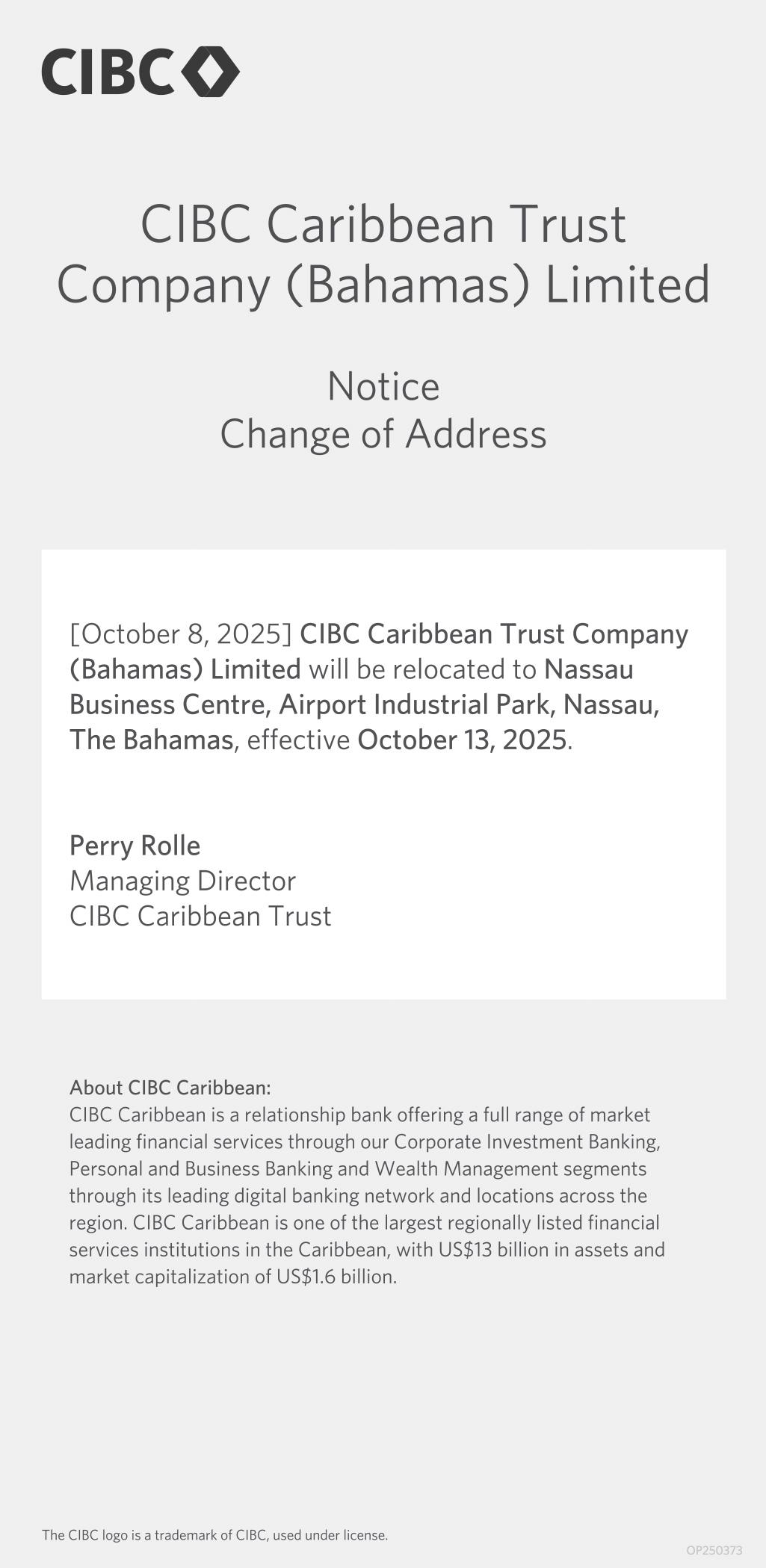
intrusion, he argued that Freeport’s quasi-governmental authority has also “been neglecting their duty” to maintain bridges and canal entrances for the past decade.
Noting that the bridge over the Grand Lucayan Waterway took seven to ten years to build, the Dupuch & Turnquest partner added that rebuilding and strengthening the Casuarina Bridge had also taken years post-Dorian having been “structurally weak” since before Hurricane Matthew in 2016.
“The Port Group of Companies had no plan or no money to take care of these essentials, leaving the island in danger of financial collapse,” Mr
Gape blasted. “This hardly inspires confidence in the hundreds of canal lot owners that rely in access to the said lots by virtue of the said bridge....”
Giving his personal views, Mr Gape added that Grand Bahama’s “future feasibility... remains seriously challenged” due to the difficulties associated with the Grand Lucayan and Grand Bahama International Airport “especially in view of the fact that Freeport and Grand Bahama have, and continue to suffer, from a sub-zero tourism market, particularly these last ten years”.
Suggesting that “there is little public confidence” in the GBPA, its affiliates and partners when it comes
to fulfilling their obligations under the Hawksbill Creek Agreement, he added: “It appears that for these, and many other reasons, the Davis government has appreciated that the time has now come for the Port area to administratively become a part of The Bahamas, and to be owned and managed by Bahamians wherever possible.
“I appreciate and fully support the Government’s efforts in this regard..... I would hope that the arbitration process now being completed will have addressed these failings of the Port Group of Companies and their many other failings, especially since 2004.”

BUSINESSWOMAN: ‘CO-ORDINATED CONSPIRACY’ TO FORCE LPIA
While the LPIA operator argued it was “not commercially feasible” to renew or extend the lease deal with Ms Mortimer, because it had been “generating limited revenue”, Justice Klein described this as “irrelevant” and suggested NAD “could not have approached” the issue with “an open mind” as it focused solely on its own economic interests and ignored the new terms set out in the settlement deed.
The settlement deed, which was central to the latest dispute between LPIA’s operator and Patmor and its affiliates, was also at the heart of a political controversy that erupted in June 2017 after Dionisio D’Aguilar, then-minister of tourism and aviation, accused the former NAD Board of bailing out Ms Mortimer and her group by writing-off, or forgiving, $1.2m of $3.3m in unpaid rental arrears.
Speaking in the House of Assembly, he asserted that this was done because of Ms Mortimer’s long-standing political connections to the then-governing Progressive Liberal Party (PLP). This prompted a furious backlash
from former prime minister, Perry Christie; the previous NAD chairman, Anthony McKinney KC, and Ms Mortimer’s then-attorney, Wayne Munroe KC, who all denied political favoritism. Mr McKinney, in a statement at the time, confirmed it was agreed that the $1.2m, or more than onethird of what was owed, would be written-off. As for the remaining $2.2m, some $800,000 was to be paid within 90 days after the settlement’s March 3, 2017, execution, with the remaining arrears and interest to be dealt with “on terms to be discussed and agreed”.
Mr Munroe, now minister of national security, told Tribune Business at the time that Ms Mortimer felt she was being treated unfairly by having to pay a rental rate almost four times’ as much as other LPIA tenants.
He asserted that she was being charged rent at 38 per cent of gross profits, compared to 10 percent for other LPIA tenants, and argued that the $1.2m write-off related to another LPIA tenant, Tyrone Nabbie’s Kafe Kalik restaurants, whose obligations Ms Mortimer had inherited after she provided a guarantee to back them. While the political

controversy swiftly died down, NAD and Ms Mortimer’s companies again found themselves at odds just two years later in a fresh battle that would produce Justice Klein’s ruling. Ms Mortimer, perhaps referring to earlier events, asserted that she and her corporate group were being targeted by a “co-ordinated conspiracy” to force them out of LPIA although she provided no names.
“The plaintiffs belong to a group of companies that lease retail space in the airport, in which they operate a restaurant, news-stand and souvenir businesses,” Justice Klein wrote.
“It appears that the catalytic events for the litigation took place during July 2019, when the first defendant [NAD] indicated that it would not renew one of three leases held by the plaintiffs following its expiration, citing various concerns about the performance of that business.”
This prompted Ms Mortimer and the Patmor Group, including its affiliates Olde Nassau Holdings and Remitrom Enterprises (formerly LPI Concessions), to launch legal action to prevent their “removal from the demised premises” covered by the lease. Justice Klein noted that they had leased commercial space at both LPIA and its predecessor “for several decades”.
Describing the disputed lease as the ‘Parma Lease’, he added that this as well as two other leases - for the news stand and restaurant respectively - were covered by the March 3, 2017, deed of settlement.
“It appears that during the years of their operation in the airport, the plaintiffs accrued significant arrears in connection with the rent for the Parma lease, and the primary purpose of the deed was to restructure the debt of the plaintiff companies on the terms stipulated in the deed,” Justice Klein wrote.
“The plaintiffs allege that the indebtedness was caused largely by the fact that, under the Parma lease, the plaintiffs’ monthly rent formula was calculated at between 35 percent to 38 percent of gross sales when other tenants’ monthly rents were pegged at 10 percent.
“The formula used to determine the rent was apparently linked to NAD’s estimated weekly enplanements of 3,000-4,500 passengers on Tuesdays through Thursdays, and 4,500-6,000 passengers on Fridays to Monday. These were said to be ‘overly optimistic’ and apparently were never realised,” the judge added.
“Nevertheless, based on these estimates, the plaintiffs allege that they undertook additional expenses associated with
building out the leased spaces to meet the technical requirements, and the rent kept accruing ‘at a gross sales rate tied to a mistaken enplanement estimate’.
“After some time had passed, it appears that NAD agreed to reduce the monthly rental payments to 10 percent of gross sales. However, the arrears had by then ballooned to ‘X amount’ at the time of the execution of the deed.”
It is unclear why Justice Klein’s judgment blanked out the sums owed and agreed to be written-off, together with details of Patmor Group’s payment plan, as these had all been disclosed when the political controversy erupted in 2017. However, that settlement was far from the end of the two sides’ differences.
“Things came to a head, however, when the plaintiffs received several letters from NAD, and later from its attorneys, indicating that a decision had been reached not to renew the Parma lease,” Justice Klein noted.
Ms Mortimer, in an affidavit, asserted: “NAD’s January 31, 2019, letter to me stated that due consideration was given to renewal of lease number NAD-FB-08-004 then set to expire on March 31, 2019, and it had been determined that ‘an automatic renewal of the lease would not be in the best interest or even reasonable”.”
The LPIA operator justified its decision on five grounds, including that the restaurant “relative to other food and beverage concessions within proximity... is well below the average revenue generated by other concessions within the food court”.
It added that a 2018 review of its food, retail and other tenants by Pragma Consulting concluded “that the concessions should be yielding more revenue, and the recommendation is that the lease should not be renewed upon expiration”.
Instead, NAD said it would put the lease and associated space out to bid “through a transparent and open” tender process with Ms Mortimer’s Olde Nassau Holdings invited to bid due to its “steady payment history since the execution of the deed of settlement”. This, NAD added, was counter to its policy of not permitting entities to bid that have defaulted on prior obligations with the airport operator.
Ms Mortimer, now represented by Maurice Glinton KC, headed straight for the Supreme Court due to a “realistic fear” she would lose a valuable commercial operation. “That it is a near certainty to happening appears from a June 6, 2019, letter from
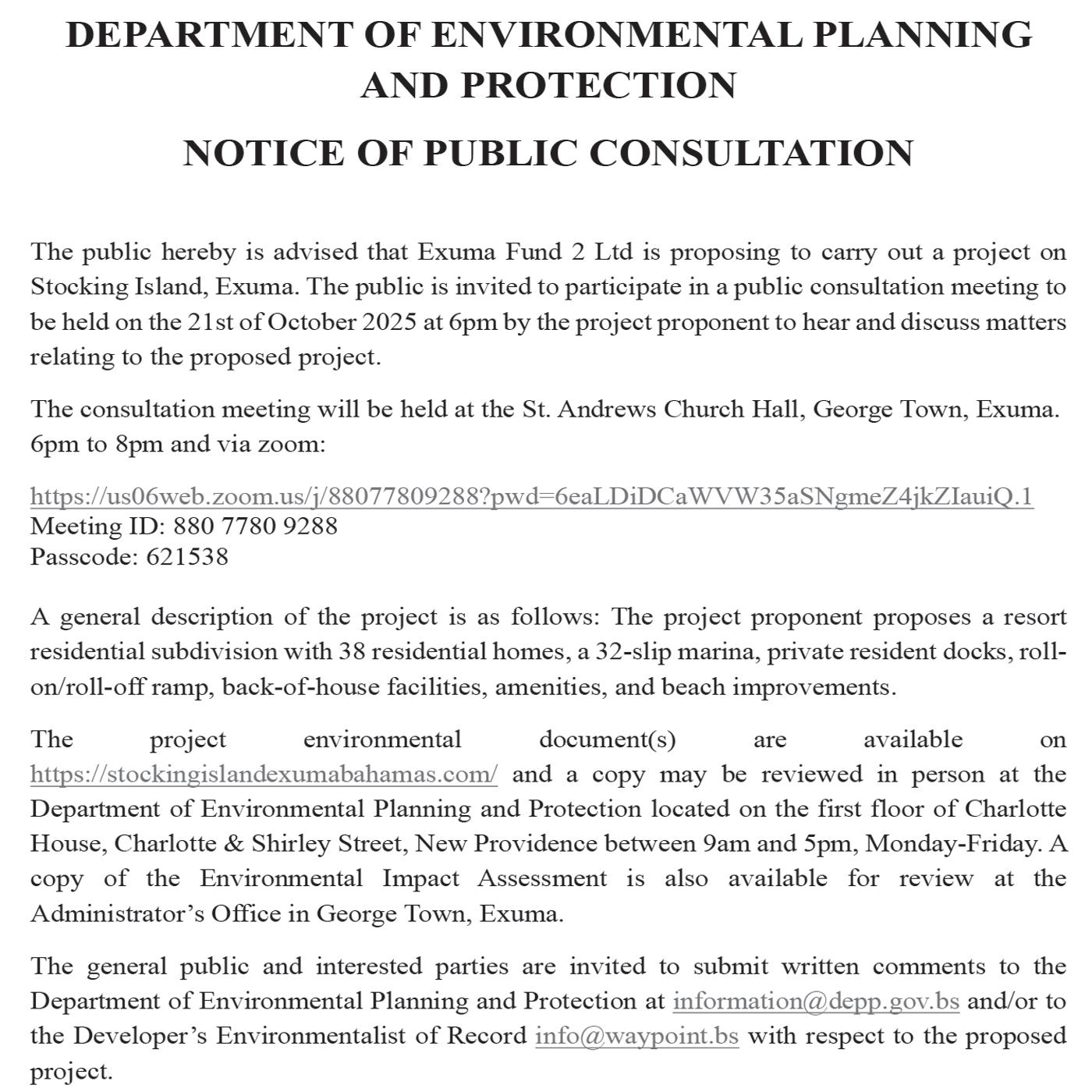
NAD’s attorneys denying the plaintiffs’ request by a letter of May 30, 2019, for NAD to reconsider its final decision,” she alleged in affidavit evidence.
“The Patmor Group [of] Companies, which are and have been good tenants in LPIA, are victims of a government-owned, unlawfully operated private company, NAD, part of a co-ordinated conspiracy with others to appropriate and then dispose of the property and the business.
“Therefore, unless this honourable court intervenes by granting interim relief pending trial of the writ action, such unlawfulness will have worked a grave injustice, causing me and them irremediable loss of reputation in the business community having eliminated our business in the LPIA.”
Ms Mortimer continued:
“The most profitable of their businesses in LPIA are a restaurant and retail souveniur and concession shop that previously operated in the older (now demolished) section of LPIA over the last 30 years in leased spaces covering an area of about 8,900 square feet.
“The business employs some 100 persons primarily in the international airport locations, all of whom along with the businesses will be adversely and immediately affect were the leases upon expiration not renewed as provided therein or not extended as the deed contemplates, and NAD continues the RPF (request for proposal) process unrestrained by a court Order.”
While Justice Klein granted the temporary injunction sought by Ms Mortimer to prevent her suffering “financial loss, and being put to great expense and being irreparably damaged”, he added that this was “a mere formality” as NAD had already seemed to agree to “hold the ring” by not interfering with the disputed lease. The two sides had also “continued in negotiations”. As for Ms Mortimer’s and Patmor’s bid for summary judgment, on the basis that NAD had provided no arguable defence to their claim, Justice Klein found that the airport operator had based its decision not to renew the Parma lease on the old terms that had been replaced by the March 3, 2017, deed of settlement.
The new terms merely mandated that NAD “agrees to consider in good faith a five-year extension of each of the lease agreement extensions” provided Patmor met “on a timely basis” all its financial and other obligations to ita condition the airport operator confirmed it had complied with since the settlement deed was signed.
NAD, in arguing that it had met the “good faith” stipulation, asserted “that they complied with this duty by, among other things, commissioning an independent study to
review the leases, which determined that it was not commercially feasible to renew the Parma lease.
“A consideration was also said to be the ‘demonstrated history’ in relation to the Parma lease of generating limited revenue. Further, they say that an offer was made to the plaintiffs to participate in an RFP (request for proposal) process in relation to proposals for leases of the space,” Justice Klein ruled.
“On the issue of whether they complied with the minimum requirements to consider the extension in good faith, in my opinion the defendants are hoisted by their petards. In fact, they have admitted that they formed the conclusion that the extension of the lease was not ‘commercially feasible’ based on the study, and the breaches of the ‘conditions precedent’ in the original lease.
“As to the former, this shows that the defendants [NAD] could not have approached the exercise of their duty to consider the extension obligation with an open mind, and the latter shows that in fact they were importing preconditions from the original lease, when on the clear language of the deed - as the court has found - they no longer applied to the exercise of the obligation to consider the extension in good faith,” he added.
“Most strikingly, it is apparent that they did not take into consideration at all the interest of the plaintiffs, or the purpose for which they had negotiated the deed. In fact, the reasons given for refusing the extension make it clear that their focus was mainly - if not exclusively - on their own economic interests, and no regard was given to the position of the plaintiffs.
“Further, the invitation to participate in the RFP and NAD’s indication that it was ‘entirely willing to give due, equal and unbiased consideration to any proposal advanced’ was entirely irrelevant to the consideration of the extension under the deed. In fact, participation in the RFP could only have been on the basis that the extension had already been refused and that the plaintiffs were relegated to competing with others for the award of the lease.”
As a result, Justice Klein ruled that NAD’s defence had “no real prospect of success”, and added: “In my judgment, the first defendant breached its obligation to consider the extension of the Parma lease in good faith, when it indicated it would not renew/extend the lease, in particular because it did not deal fairly and openly with the plaintiffs and did not have regard to the plaintiffs’ interest.”
However, he declined to Order “specific performance” and mandate that NAD consider extending the lease “in good faith” after determining that damages would be an adequate remedy.
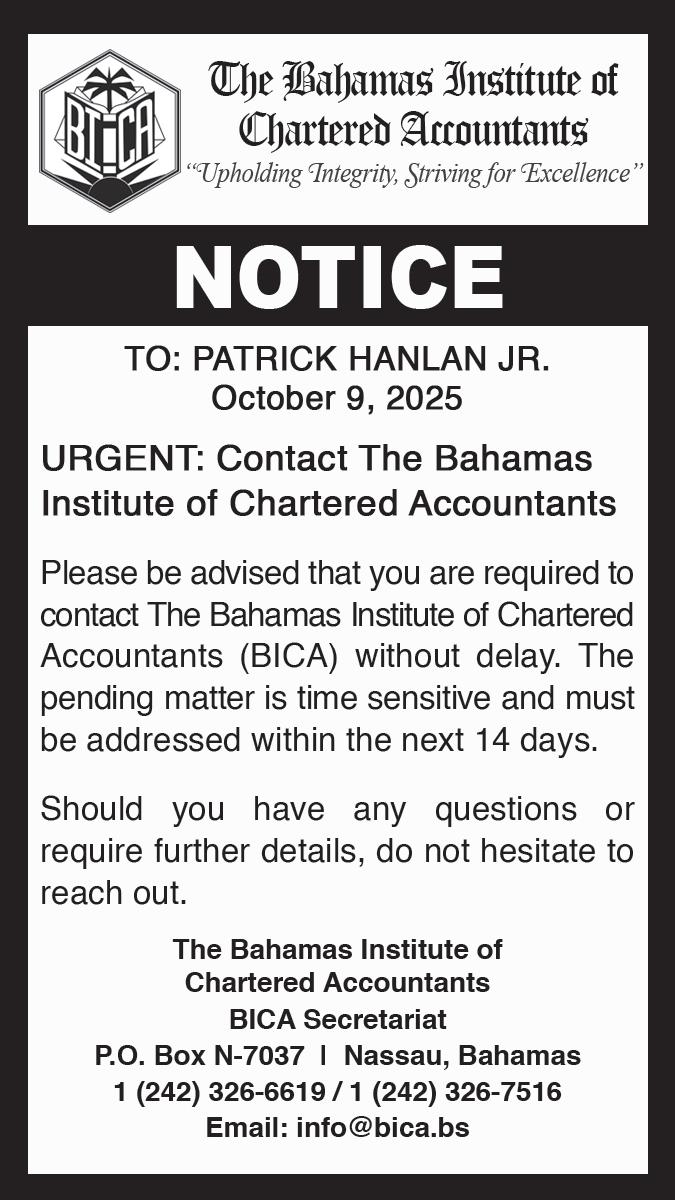
Bahamas Grid builds Frank Watson Boulevard complex
take over.” Bahamas Grid Company, in its replies to Tribune Business, said it is also “in the process of building three new high voltage switching stations. They will be completed mid-2026. Work began in late May 2025”.
Bahamas Grid Company’s original 25-year term can be extended for a further ten years if both sides agree, making it a potentially 35-year deal that could go through to 2060. Bahamas Grid Company is 60 percent owned by private investors, with BPL holding a minority 40 percent interest.
Bahamas Grid Company’s management firm is Island Grid. Eric Pike, Island Grid’s principal, also heads North Carolina-headquartered Pike Electrical, which is supplying the manpower, materials and resources to effect the New Providence energy grid’s transformation until Bahamas Grid Company gets up to speed. The latter began work in April 2025 after completing all agreements with the Government.
“The PPP is for 25-plus
years with Bahamas Grid Company initially performing the foundational upgrade project to loop the transmission system, build a new switching station and upgrade the four major substations on the island,” it said in last week’s progress report.
“In addition, Bahamas Grid Company will be performing the operations and maintenance of the New Providence transmission and distribution system for the next 25-plus years. In August 2024, Bahamas Grid Company began deploying contract distribution crews to reconductor high-outage feeder lines, assist existing BPL crews with outage and storm response, and begin installing protection devices.
“In April 2025, the final agreements were signed and Bahamas Grid Company officially formed and took over the operation and maintenance of the New Providence transmission and distribution system.” However, these agreements have yet to be disclosed to the Bahamian people despite pledges by Prime Minister Philip Davis KC and his administration to do so.
Bahamas Grid Company, though, said it has acquired and cleared the 25 acres of land off Frank Watson Boulevard that “will soon become permanent office space, and also house training facilities and warehouses”, although it did not identify the location. It is temporarily operating from 7,300 square feet of office space.
“Seventy million dollars in materials have been purchased and expedited to support this grid project,” Bahamas Grid Company said. “Three new substations are being built now, which will add valuable protection to aging generation assets and transmission lines, as well as allow for the rerouting of power to prevent large-scale outages...
“One hundred and forty-four steel poles were installed to replace aging wood structures that were at extreme risk of storm failure. Our new, larger steel structures are category five rated. A $1m investment was made to launch our IT solutions set, including work management system, procurement system, GIS and outage management system.
CHINA’S EXPORTS TO US DROP IN SEPTEMBER, WHILE RISE IN GLOBAL SHIPMENTS HITS A SIX-MONTH HIGH
By CHAN HO-HIM AP Business Writer
CHINA’S exports to the United States fell 27% in September from the year before, even though growth in its global exports hit a six-month high.
Customs figures released Monday showed that China’s worldwide exports were 8.3% higher than a year earlier, at $328.5 billion, surpassing economists’ estimates. That was markedly better than the 4.4% yearon-year increase in August. Imports grew 7.4% last month, significantly better than a 1.3% increase by year in August, although a weaker domestic economy and a real estate sector downturn continue to weigh on demand and consumption.
China’s exports to the United States have fallen for six straight months. In August they dropped 33%.
The outlook is cloudy as a truce between Beijing and Washington unravels and both sides hit out with new tariffs and other retaliatory measures.
As exports to the United States have come under pressure from US President Donald Trump’s policies aimed at trying to
get manufacturers to shift factories to America, China has expanded markets for its products in other regions.
Shipments to Southeast Asia grew 15.6% year-onyear in September. Exports to Latin America and Africa were up 15% and 56%, respectively.
“Currently, the external environment is still severe and complicated. Trade is facing increasing uncertainty and difficulties,” Wang Jun, vice minister of China’s customs agency, said at a press conference Monday. “We still need to put in more efforts to stabilize trade in the fourth quarter.”
China’s exports “continue to show resilience given the low costs and limited choices for replacement globally despite the higher tariffs”, said Gary Ng, a senior economist at Natixis. “What is more worrisome is not only tariffs but export controls,” Ng added. “If we begin to see an escalation in export controls halting supply chains, this may have a more prolonged impact.”
Tensions with the US reignited Friday after Trump threatened an additional 100% tariff on Chinese goods and export controls on “critical” software.
LEGAL NOTICE
GRANDMOUNT LIMITED
INTERNATIONAL BUSINESS COMPANIES ACT (No.45 of 2000)
In Voluntary Liquidation
Notice is hereby given that in accordance with Section 138 (4) of the International Business Companies Act, (No.45 of 2000), that GRANDMOUNT LIMITED (Registration no. 20175 B is in dissolution. The date of commencement of the dissolution is the 8th October, 2025. The Liquidator of the Fund is Crowe Bahamas and can be contacted at Harbour Bay Plaza, Shirley Street, Suite 587, P. O. Box AP-59223, Nassau, Bahamas. Email andrew.davies@crowe.bs . All persons having claims against the above-named company are required to mail and email their names, addresses and particulars of their debts or claims to the Liquidator before 7th November, 2025.
Crowe Bahamas Liquidator

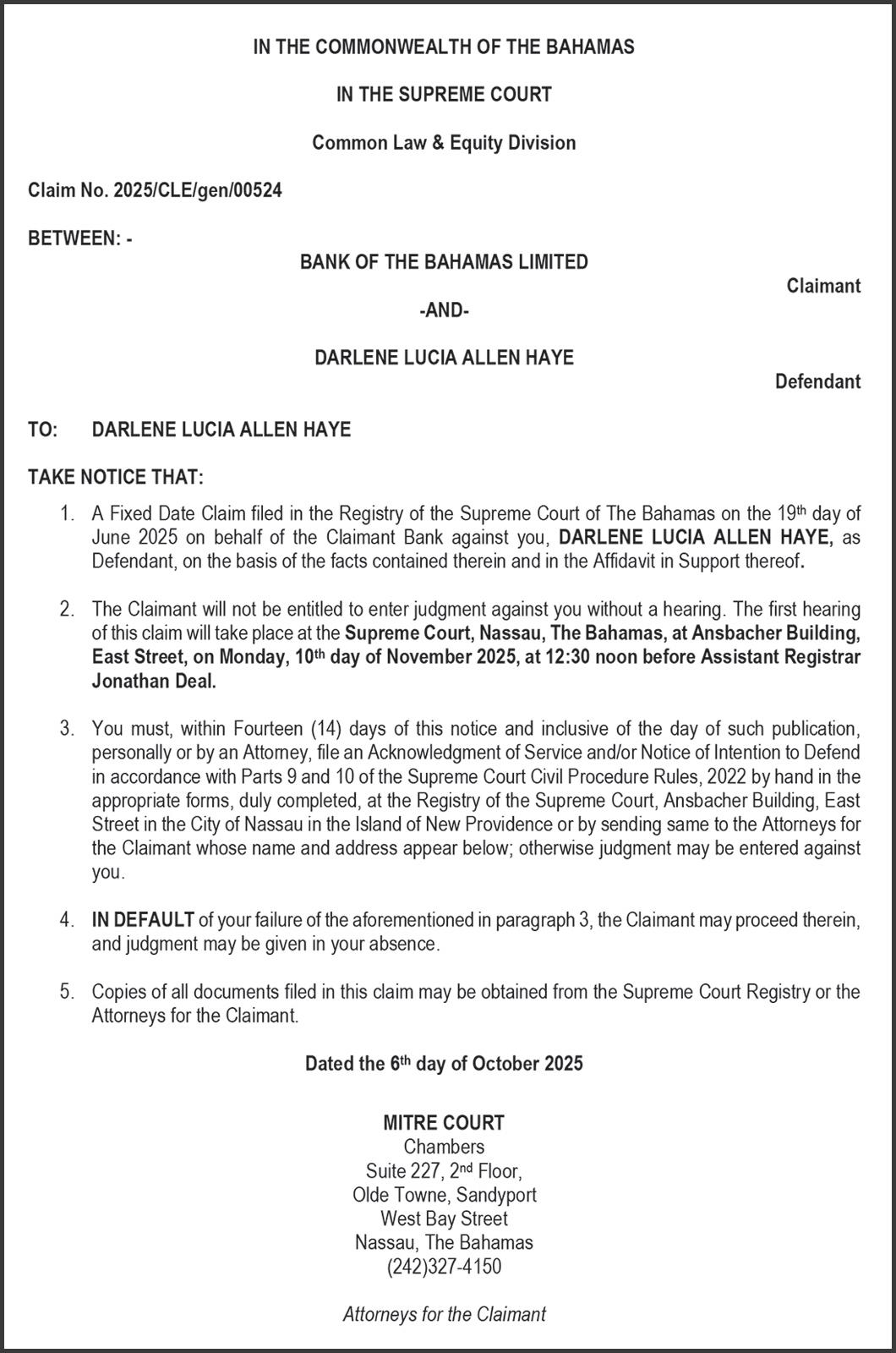











Ex-Chamber chief fears price
rises if operations outsourced
CUT-OFF from page one
and undermining the ease of doing business.
The Ministry of Energy and Transport, in yesterday’s statement, said the planned upgrades - which are due to be “significantly completed” by February 2026 - will involve the “full outfitting of CCTV and security lights”; positioning of storm water drainage systems; installation of security fencing; and the building of an administration office.
The latter will feature a reception area, three offices, kitchen, monitoring station and restroom facilities. In a sign of just how heavily involved the US embassy is, the contractor chosen to undertake the improvements is American and was selected following a competitive bidding process that was run and overseen by the Nassaubased mission.
Quality Logistics and Procurement Services, according to Internet research conducted by this newspaper, is headquartered in Orlando with a satellite office in Colorado, and specialises in construction management, supply
chain logistics and procure-
ment activities. It is also a registered vendor with the US government, including its Defence Logistics Agency.
The Ministry of Energy and Transport yesterday said “several Bahamians will be involved during the construction phase”, although it did not provide estimated numbers and state whether contractors will be able to participate in the project or if this just represents an employment opportunity for workers.
Mrs Coleby-Davis said: “Hurricane Dorian inflicted significant damage on the facilities, and I have listened intently and heard the concerns of the people and business owners in Abaco. My commitment has been to give serious attention to enhancing the facility, and this partnership will help us achieve full compliance with International Ship and Port Facility (ISPS) measures.”
The agreement with the US embassy has taken some time to conclude. Mrs Coleby-Davis told this newspaper more than 13 months ago, on September 2, 2024, that her
ministry is holding talks with the US Embassy in Nassau “to have some security upgrades completed”.
And the ministry’s statement made no mention of any outcome or decision being taken regarding the competitive bidding process previously launched by the Government seeking a public-private partnership (PPP) with commercial operators to manage both the Marsh Harbour and Cooper’s Town ports.
Arawak Port Development Company (APD), the BISX-listed operator of the Nassau Container Port, recently told Tribune Business it was “aware that the Marsh Harbour project was awarded to another entity that responded to the RFP” although it did not name them. It is unclear if this is Quality Logistics and Procurement Services.
Meanwhile, Mrs DeGregory-Miaoulis, who advocated for the Marsh Harbour port to be treated as a priority by the Government when Chamber president, said of the ministry’s announcement: “All I can say is that it’s about bloody time.
PUBLIC NOTICE
We are aware of the malicious content currently being circulated about The Cricket Club Restaurant & Pub. As a proud family-run business of over 27 years, we have always been an instrumental part of our community - known for our hospitality, tradition, and dedication to quality service.
The Cricket Club was founded by Constance Robertson and the late Christopher Robertson who shared a vision of bringing an authentic pub experience to The Bahamas. That vision has stood strong for nearly three decades, built on integrity and community spirit.
The claims being spread are false, misreading, and defamatory. We stand firmly by our record and reputation and welcome any proper official investigation into the matter. We are confident that the truth will confirm our longstanding commitment to fairness, respect, and excellence in service.
Thank you to our loyal patrons and community members who continue to support us.
- The Management & Family of Cricket Club Restaurant & Pub
NOTICE

NOTICE is hereby given that GABRIELLA VANESSA LOUVERTURE of Ford Close, Carmichael Road, New Providence, Bahamas is applying to the Minister responsible for Nationality and Citizenship, for registration/naturalization as a citizen of The Bahamas, and that any person who knows any reason why registration/ naturalization should not be granted, should send a written and signed statement of the facts within twenty-eight days from the 7th day of October, 2025 to the Minister responsible for nationality and Citizenship, P.O. Box N-7147, Nassau, Bahamas.
NOTICE
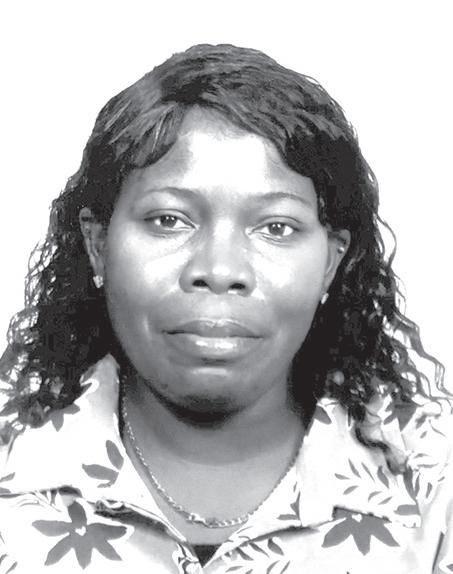
NOTICE is hereby given that ROSELIA JASMIN of Wrights Lane, Wulff Road, New Providence, Bahamas is applying to the Minister responsible for Nationality and Citizenship, for registration/naturalization as a citizen of The Bahamas, and that any person who knows any reason why registration/naturalization should not be granted, should send a written and signed statement of the facts within twenty-eight days from the 7th day of October, 2025 to the Minister responsible for nationality and Citizenship, P.O. Box N-7147, Nassau, Bahamas.
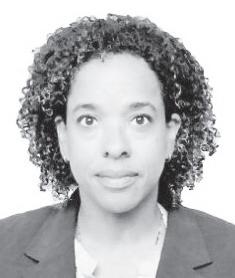
It’s way overdue and I’ll be happy to see the work actually in progress, not just announced. I’m going to go down to the port to see the first shovel in the ground.
“It’s extremely important because everything is imported, and if we were to be shut down it would put us all of out of business or further increase our cost of doing business because it would mean we would have to trans-ship through Nassau or Freeport, which would add another layer of transportation costs on to something that is already expensive.
“That’s been the focus and concern all along; that we’d get shut down and, through the grace of God, we’ve been allowed to operate for too long under sub-standard conditions,” she added.
“There’s always been this threat over-shadowing our existence of being cutoff. That was the primary threat.”
Amid hopes that the Government’s partnership with the US embassy will now resolve all ISPSrelated concerns with the Marsh Harbour port, Mrs DeGregory-Miaoulis added that the second impact from its current condition was “the visual and psychological” fallout, plus the operational inconvenience, for companies and persons who have to operate in that area
without “proper business facilities”.
Customs, port employees, and staff from the likes of Tropical Shipping and Seacor have “had to bear through this six years-plus of operating from a substandard facility and the inconvenience that goes with it”. However, the former Chamber president stopped short of advocating that the Government outsource the port’s management to a private company for fear this will lead to increased cost of goods.
“Maybe after completion of this project they’ll look to a new operating manager,” she added. “Who knows? I don’t see why the Government would give up managing the port themselves. It’s a catch-22. It depends on who the private company is and if it’s going to be one that knows how to operate a port...
“I don’t see why our government couldn’t properly manage a port with properly trained Bahamian staff. I don’t see why we should outsource the port. I personally don’t think the Government should be outsourcing the management of the port to a private company because that will automatically raise costs and take away the opportunity for Bahamians to be employed and trained in the Government sector.
“Why not? Every time we outsource to these
NOTICE

NOTICE is hereby given that CELINA REMY Bernard Road, Cox Street, Nassau, The Bahamas, is applying to the Minister responsible for Nationality and Citizenship, for Registration/ Naturalization as a citizen of The Bahamas, and that any person who knows any reason why registration/naturalization should not be granted, should send a written and signed statement of the facts within twenty-eight days from the 14th day of October 2025 to the Minister responsible for nationality and Citizenship, P.O. Box N-7147, Nassau, New Providence, The Bahamas.
NOTICE

NOTICE is hereby given that NESKER PIERRE of The Bluff, Eleuthera, The Bahamas, is applying to the Minister responsible for Nationality and Citizenship, for Registration/ Naturalization as a citizen of The Bahamas, and that any person who knows any reason why registration/naturalization should not be granted, should send a written and signed statement of the facts within twenty-eight days from the 7th day of October 2025 to the Minister responsible for nationality and Citizenship, P.O. Box N-7147, Nassau, New Providence, The Bahamas.
NOTICE

NOTICE is hereby given that MCLURY GASPARD of North Eleuthera Height, The Bahamas, is applying to the Minister responsible for Nationality and Citizenship, for Registration/ Naturalization as a citizen of The Bahamas, and that any person who knows any reason why registration/naturalization should not be granted, should send a written and signed statement of the facts within twenty-eight days from the 7th day of October 2025 to the Minister responsible for nationality and Citizenship, P.O. Box N-7147, Nassau, New Providence, The Bahamas.
NOTICE

that PATRICK PHILOGENE Carmichael Road, Nassau, The Bahamas, is applying to the Minister responsible for Nationality and Citizenship, for Registration/ Naturalization as a citizen of The Bahamas, and that any person who knows any reason why registration/naturalization should not be granted, should send a written and signed statement of the facts within twenty-eight days from the 14th day of October 2025 to the Minister responsible for nationality and Citizenship, P.O. Box N-7147, Nassau, New Providence, The Bahamas.
private companies prices go up.” Tribune Business previously revealed that the Government was eyeing a combined $100m investment to transform Abaco’s two commercial shipping ports into facilities that meet global best practices and standards.
The PPP tender documents for both the Marsh Harbour and Cooper’s Town ports revealed that bidders on the former must show they have combined equal capital and access to debt financing of “at least $60m” on the former. For Cooper’s Town, the figure was slightly less at $40m in collective equity and debt funding.
The tender documents revealed that the Government wanted the ownership structure for both Abaco port PPPs to mirror that which was put in place for BISX-listed Arawak Port Development Company (APD), operator of the Nassau Container Port, and which bid on the Marsh Harbour RFP.
For both the Marsh Harbour and Cooper’s Town ports, the RFPs stipulated that a combined 20 percent equity ownership will be “offered for sale to the general public” although it did not specify whether this will be via an initial public offering (IPO) or other method.
The remaining 80 percent ownership interest was to be split evenly between the Government and winning PPP bidder, with each holding 40 percent. This split matches APD’s structure, where the Government and shipping industry each hold a 40 percent stake.
The Ministry of Transport and Energy, in yesterday’s statement, said: “The Government of The Bahamas understands the significance of the Marsh Harbour port to the people and economy of Abaco, and views this development partnership with the US Embassy as a significant step in deepening trade, enhancing supply chain resilience and expanding opportunities for Bahamians and Bahamian businesses.”
NOTICE

NOTICE is hereby given that DONACIEN JOEL of Carmichael Road, Nassau, The Bahamas, is applying to the Minister responsible for Nationality and Citizenship, for registration/ naturalization as a citizen of The Bahamas, and that any person who knows any reason why registration/ naturalization should not be granted, should send a written and signed statement of the facts within twenty-eight days from the 6th day of October, 2025 to the Minister responsible for nationality and Citizenship, P.O. Box N-7147, Nassau, Bahamas.

NOTICE is hereby given that GREGORY EMMANUEL DORILAS of Soldier Road, St Michael Street, New Providence, Bahamas is applying to the Minister responsible for Nationality and Citizenship, for registration/naturalization as a citizen of The Bahamas, and that any person who knows any reason why registration/ naturalization should not be granted, should send a written and signed statement of the facts within twenty-eight days from the 6th day of October, 2025 to the Minister responsible for nationality and Citizenship, P.O. Box N-7147, Nassau, Bahamas.
NOTICE

NOTICE is hereby given that SANDRA ALEXIS of P.O. Box NB7060. Student Avenue, Nassau, The Bahamas, is applying to the Minister responsible for Nationality and Citizenship, for Registration/ Naturalization as a citizen of The Bahamas, and that any person who knows any reason why registration/ naturalization should not be granted, should send a written and signed statement of the facts within twenty-eight days from the 7th day of October 2025 to the Minister responsible for nationality and Citizenship, P.O. Box N-7147, Nassau, New Providence, The Bahamas.
Reforms ‘confidence-enhancing’ for domestic financial stability
correspond with efforts to enhance the Bahamian resolution framework for all deposit-taking entities.
“Focus is on strengthening the role of the Deposit Insurance Corporation in matters that relate to domestic financial stability, improving the robustness of systems that handle weak or failing institutions, and boosting the speed, efficiency and effectiveness of the Deposit Insurance Corporation during the claims payout process.
“For the consumers, the regulatory reforms are expected to boost confidence and trust in financial institutions and the financial services sector. The proposed legislative amendments would establish dedicated back-up funding for the Deposit Insurance Corporation, and essential liquidity for timely payouts to depositors when it is required,” Mr Rolle added.
“Bolstered public confidence in financial institutions benefits all institutions, and allows institutions to effectively satisfy their role in providing credit within the economy.” Mr Rolle, in March this year, revealed
that 580,000 Bahamian bank accounts, representing 96 percent of the total, were fully protected against their institution’s possible collapse as at year-end 2024. He suggested the Deposit Insurance Corporation would take another “two to three years” to reach its $130m target size, having reached $101.5m at year-end 2024 - some $29.5m shy of this goal. However, it was already well within international benchmarks, standing at 3.6 percent of insured deposit values after enjoying an average 11 percent growth rate over the previous five years.
“As at the end of 2024, the size of the Deposit Insurance Fund was $101.5m (3.6 percent of insured deposits’ values),”
Mr Rolle said on March 31, 2025. “There were approximately $2.8bn of insured deposits within 18 member institutions. In this regard, the number of fully insured accounts was approximately 580,000, which is a coverage ratio of 96 percent of the accounts.
The Deposit Insurance Fund was established in the late 1990s following the collapse of Gulf Union Bank (Bahamas), which left many small local - as well as
large - depositors exposed to life-changing financial losses because they were unable to recover their deposits. The Fund now fully insures all deposits up to a maximum $50,000, thus protecting most individuals and families from financial hardship should a bank fail.
The Deposit Insurance Fund is financed by annual legally-mandated contributions from the commercial banks, both Canadian and Bahamian-owned, as well as all other deposit-taking institutions in The Bahamas such as the credit unions. The contribution rate was doubled as of January 2024 from one-twentieth of 1 percent to one-tenth of 1 percent of insurable deposits.
Mr Rolle, detailing the Central Bank’s goals for the overall reform package, told Tribune Business: “The key objectives of the proposed reforms are to ensure consistency in the application of resolution measures and supervision across domestic banks and credit unions, as both groups of entities are members of the Deposit Insurance Corporation (DIC).
“This includes a harmonisation of the process by which the Central Bank can engage with the Boards and management of financial

co-operatives when the entities require closer oversight. In addition, for credit unions, it gives the Central Bank similar regulatory authority, as it has for banks, to review the suitability of persons appointed to boards and senior management and positions in credit unions.
“Other proposed governance reforms in the reform package are also intended to strengthen oversight of the sector..... As to the implementation process, it is anticipated that financial institutions would be able to readily adapt their operational frameworks to accommodate the proposed legislative changes. However, the feedback from stakeholders during public consultation should help to identify revisions that could be incorporated into the proposals.”


We’re hiring
Risk
KPMG
Qualifications
The
required.
Professional certifications such as Certified Risk Manager (CRM), Certified Internal Auditor (CIA), or equivalent preferred.
Strong business acumen, with experience in risk management, compliance, and governance frameworks. Proven ability to manage multiple projects, set priorities, and meet deadlines, with experience mentoring or managing staff.
Excellent analytical, problem-solving, and decision-making skills, with a deep understanding of risk governance, financial metrics, and organizational design.
• Work experience in highly regulated sectors such as financial services, healthcare, or public service is a plus.
Strong attention to detail, interpersonal skills, and the ability to maintain composure in high-pressure environments.
Proficiency in data analysis tools, risk management software, and Microsoft Office Suite is essential. Excellent written and verbal communication skills, with the ability to present complex information clearly to clients and senior stakeholders.
Director, Technology Consulting & Head of Government Technology
Our Advisory practice in The Bahamas seeks an experienced IT Strategy and Transformation Leader that will drive the development and implementation of technology strategies, transformation initiatives, and policy development for the government sector. This role will report to the Managing Director of Technology Consulting and will work closely with government entities and private sector clients to ensure alignment with business objectives, the adoption of best practices, and the implementation of innovative technology solutions.
Qualifications & Experience:
Over 10 years of experience in IT strategy and transformation, particularly within the professional and government sectors.
Proven track record of leading large-scale IT projects and transformation initiatives.Strong understanding of cybersecurity, risk management, and regulatory compliance.
• Excellent stakeholder engagement and communication skills.
Ability to manage project budgets, resources, and vendor relationships effectively
Demonstrated ability to drive innovation and continuous improvement in technology services.
Experience in business development and proposal creation is a plus.
Tax Managing Director
As a leading position within the firm, the Managing Director will be reponsible for managing The Bahamas tax business and fulfilling Tax functions that require a high level of understanding. The individual will play a key role in the organisation and will oversee the development and evaluation of various engagements including international tax projects, direct and indirect tax advisory and compliance engagements for clients in a variety of sectors. The individual will assist our clients as part of multidisciplinary and multijurisdictional teams providing specialist tax advice on a variety of complex issues including; global tax strategy and structure, VAT, economic substance, AEOI, FATCA, CRS, re-organizations
Key job functions and responsibilities include but are not limited to:
Directing client and engagement acceptance engagement planning, oversight, review and sign-off
• Be market facing, drive sales on allocated clients and target organizations, developing and presenting thought leadership. Conduct high-level conversations with senior stakeholders in the markets and be capable of introducing relevant specialists from across the firm.
Lead by example with client relationships, technical quality, service delivery and commercially. Identify key client issues that represent opportunities for other KPMG teams to capitalize on and play an active role in introductions.
Ensure adherence to
Nobel economics prize goes to three researchers for explaining innovation-driven economic growth
STOCKHOLM Associated Press
THREE researchers who probed the process of business innovation won the Nobel memorial prize in economics on Monday for explaining how new products and inventions promote economic growth and human welfare, even as they leave older companies in the dust.
Their work was credited with helping economists better understand how ideas and technology succeed by disrupting established ways — a process as old as steam locomotives replacing horse-drawn wagons and as contemporary as e-commerce shuttering shopping malls.
The award was shared by Dutch-born Joel Mokyr, 79, who is at Northwestern University; Philippe Aghion, 69, who works at the Collège de France and the London School of Economics; and Canadian-born Peter Howitt, 79, who is at Brown University.
A clearer understanding of ‘creative destruction’
The winners were credited with better explaining and quantifying “creative destruction,” a key concept in economics that refers to the process by which new innovations replace older technologies and businesses.
The concept is usually associated with economist Joseph Schumpeter, who outlined it in his 1942 book “Capitalism, Socialism and Democracy.” Schumpeter called the concept “the essential fact about capitalism.”
The Nobel committee said Mokyr “demonstrated that if innovations are to succeed one another in a self-generating process, we not only need to know that something works, but we also need to have scientific explanations for why.”
Aghion and Howitt studied the mechanisms behind sustained growth, including in a 1992 article that offered a complex mathematical model for creative destruction that added new aspects not included in earlier models.
Examples of creative destruction include e-commerce disrupting retail, streaming services replacing videocassette and DVD rentals and internet advertising undermining newspaper advertising. A classic illustration is horsecart whip makers put out of business by the automobile.
Process is key to economic growth and human welfare
“The laureates’ work shows that economic growth cannot be taken for granted. We must uphold the mechanisms that underlie creative destruction, so that we do not fall back into stagnation,” said John Hassler, chair of the committee for the prize in economic sciences.
Howitt and Aghion’s model showed that markets with too few dominant companies can hinder innovation and growth — a concern that has been raised about industries such as telecommunications, social media platforms and airlines.
They found it was important to support people who are affected by changes while making it easy to move to more productive workplaces — to protect workers more than specific jobs. They also stressed the importance of social mobility, where a person’s profession or trade is not defined by their parents’ identity.
Mokyr has long been known as an optimist about technological innovation. About a decade ago, many economists took a more pessimistic view, arguing that inventions such as smartphones or even the internet had less of an economic impact than previous developments such as the airplane or the car.
Mokyr responded that
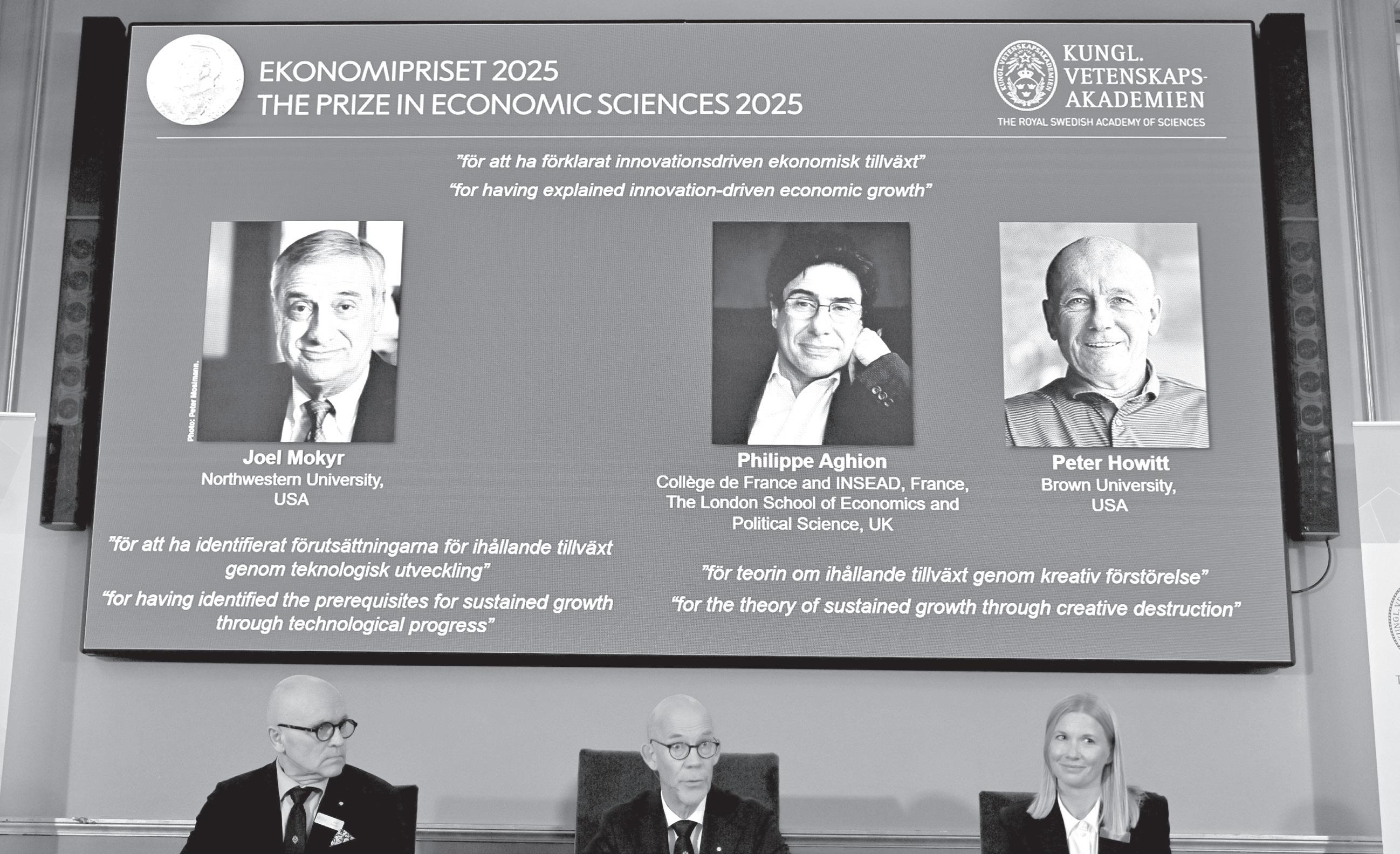
because many new services were either cheap or free, their impact wasn’t evident in economic data, but they still provided enormous benefits.
In an interview with The Associated Press in 2015, he cited the music streaming service Spotify as an example of an “absolutely astonishing” innovation that economists had difficulty measuring. Mokyr noted he once owned more than 1,000 CDs and many vinyl records, but now he could access a huge music library for a small monthly fee.
He acknowledged that new inventions often cause at least short-term job loss or reduced earnings for workers. Like many economists, he argued that innovations also created unexpected jobs that offered fresh opportunities.
The Nobel committee noted that for much of human history, economic stagnation, rather than growth, was the norm.
Starting with the Industrial Revolution in the 18th century, European and later other economies began to grow.
Innovation — and how to foster it — is an urgent question in Europe, where a report by former European Central Bank head Mario Draghi argued that Europe faces a rising productivity gap with the U.S. in digital technology. Aghion said the challenge was for Europe to keep pace with the U.S. and China in innovation by promoting research and the venture capital financing to turn ideas into businesses.
“We have to wake up,” he told AP. “Because you know who will win in this competition? Those who innovate.”
The effects of artificial intelligence
Aghion said he believes artificial intelligence has “huge growth potential, but it all depends on the institutions and policies we put in place.” He said policies need to foster competition because big actors already in the sector know how to manage regulations, and that may discourage new entrants.
Mokyr said the notion that AI is a “monstrosity” that will drive humans into extinction comes from “people who have read too much dystopian fiction. Nothing of the sort is ever going to happen.”
Instead, he said at a news conference at Northwestern that he views it “primarily as a magnificent research assistant” that can gather and process information quickly.
He also disputed the notion that machines replace people. “They move us to more interesting, more challenging
work,” he said.
Early morning surprises
Mokyr said he awoke around 5am and opened his laptop to find multiple congratulatory messages, which confused him.
He checked his phone and saw a message from a Swedish number. He called it and was told he won the prize.
“I think I sat there for 15 minutes, sort of dazed,” he told AP in an interview at his home in Skokie, Illinois. He will turn 80 next summer but said he has no plans to retire.
“This is the type of job
that I dreamed about my entire life,” he said.
Howitt said he discovered he had won the Nobel prize when a Swedish reporter called him as he was waking up. At first, he thought it was a hoax.
“We had no Champagne in the refrigerator. We were not anticipating this,” he joked with reporters.
Aghion said the Nobel committee did not have his co-winners’ contact information, so they asked him for it.
“It’s really the dream prize, with the people I dreamed of getting it with,”
Aghion said.
What exactly did the three economists win?
One half of the 11 million Swedish kronor (nearly $1.2 million) prize goes to Mokyr, and the other half is shared by Aghion and Howitt. Winners also receive an 18-carat gold medal and a diploma.
The economics prize is formally known as the Bank of Sweden Prize in Economic Sciences in Memory of Alfred Nobel. The central bank established it in 1968 as a memorial to Nobel, the 19th-century
Swedish businessman and chemist who invented dynamite and established the five Nobel Prizes.
Since then, it has been awarded 57 times to a total of 99 laureates. Only three of the winners have been women.
Nobel purists stress that the economics prize is technically not a Nobel Prize, but it is always presented together with the others on December 10, the anniversary of Nobel’s death in 1896. Nobel honours were announced last week in medicine, physics, chemistry, literature and peace.


Geriatric Hospital celebrates 60 years of caring for seniors
By ALESHA CADET
Tribune Features Reporter acadet@tribunemedia.net
THE Geriatric Hospital is marking a major milestone this year, its 60th anniversary - with an event that speaks directly to the heart of compassion and community care.
The 10th Annual Caregiver Symposium, themed “Empowering Caregivers: Nurturing Hope, Protecting Well-being,” is set for this coming Friday, October 17, from 8am to 2pm at the Anglican Church of Epiphany on Prince Charles Drive.
Dr Indira Grimes, medical advisor to the Public Hospitals Authority, former Director of Geriatric Services, and chairperson of the Caregiver Symposium, described the anniversary as a deeply meaningful moment for both the hospital and the wider community.
“The 60th anniversary
marks a significant milestone for Geriatric Hospital. One of only two in the Caribbean region, the facility has provided optimal health and social care to senior citizens throughout the Bahamas and their caregivers since its inception in 1965,” she said. Dr Grimes noted that in the past decade, the hospital has made significant progress in caregiver education and support. “In the past decade Geriatric Hospital has made strides in providing education and support to informal and formal carers of older persons through one-on-one interaction in the clinic setting, telehealth and the Annual Caregiver Symposium,” she said.
This year’s event promises to offer a variety of presentations and discussions designed to support caregivers in every stage of their journey.
“Expect a series of
presentations on various topics that impact caregivers and older persons daily.
Information will be shared that will hopefully strengthen the skills, knowledge, and coping mechanisms of caregivers throughout their journey of love and service to others to foster resilience,” Dr Grimes explained.
Moreover, she went on to say the theme, “Empowering Caregivers: Nurturing Hope, Protecting Well-being”, was chosen for several vital reasons that underscore the symposium’s mission.
According to Dr Grimes, caregivers, especially family caregivers, are the cornerstone of support for loved ones with various needs, illnesses, or disabilities. She believes their work is essential for the well-being and recovery of the care recipient.
She added that the symposium will also tackle the
often-overlooked emotional toll of caregiving.
“Caregiving is often physically, emotionally, and financially demanding. The Symposium will highlight recognised challenges like burnout, stress, anxiety, depression, and isolation that caregivers frequently experience,” said Dr Grimes.
The doctor emphasised the importance of giving caregivers the resources and confidence they need.
“Empowering Caregivers speaks to the necessity of providing them with the knowledge, skills, resources, and confidence to effectively manage their responsibilities and advocate for their loved ones and themselves. Empowerment can lead to increased self-efficacy and better care outcomes,” said Dr Grimes. Another important aspect of the theme, she noted, is maintaining hope.
How families reset sleep patterns before
“Nurturing Hope is
included to counteract the feelings of hopelessness or overwhelming stress that can accompany long-term caregiving,” she said. She said this emphasises the positive aspects of the role, the resilience of caregivers, and the importance of maintaining a sense of purpose and optimism.
Attendees this weekend can expect a range of engaging and practical presentations, including discussions on compassion fatigue and burnout, dementia care, safety tips for bedside care, advanced care planning, hearing health, and national insurance benefits for older persons.
To support caregivers’ overall well-being, Dr Grimes said there will also be “talks on how to cope with burnout and how to plan for caregiving, health checks by Ministry of Health and Wellness teams, pastoral care, and
ting anexample. Ifmy son seesme scrollingonmy phone untilmidnight, hewill think it is fine for him too,” he adds. Creatinga cool,calm space
introduction to support organizations like the Disability Association”.
The event is open to all who provide care to seniors; both informal and formal.
“All persons who care for seniors, informal; family, friends and formal meaning health-trained professionals,” she said. For convenience, the symposium will also be accessible virtually via Zoom (Webinar ID: 878 1563 7052; Passcode: PHA2025).
Ultimately, Dr Grimes said the hope is for every participant to leave the symposium feeling encouraged and equipped to continue their vital work.
“We hope for participants leave better supported, educated and empowered to care well and safely for seniors under their charge whether it be a family member, friend or client,” she said.
screentime intheevening, and small habits that make the bedroom more comfortable. Adjusting bedtime and wakeup times bya few minutes eachnight helpschildren’s bodies adapt without a shock. Avoidingphones, tablets,and televisionsbefore bedgives the brain time to wind down.nals that it istime to rest are

should be so proud!) But now, you may be wondering: Has your risk of lung cancer gone up in smoke, too?
When you quitsmoking, yourrisk oflung cancergoes down, along with your risk for a varietyof otherconditions. But you’restill atahigher risk than someonewho never smoked.
Shanique addedthat itis worth paying attention to what children eat anddrink before Heavymeals, caffeine, or sugary snacks can make it harder tofall asleep.Gentle activities like reading or light conversation canhelp s sleep is one of the bestways to prepare childrenfor learning,focus, andgood behaviorinschool. By making small adjustments in August, familiescan help make thefirst day ofschool a smooth one,and setthe tone for healthy habits all year
Porky’s paying it back with cancer support
AT PORKY’S Gas Station on East Street South, October isn’t just about pink ribbons - it’s about giving back.
On Friday morning, members of the press gathered for a press conference hosted by owner Bernard “Porky” Dorsett, who announced a month-long campaign in support of the Sister Sister Breast Cancer Support Group.
Customers will receive ten cents off every gallon of gas or diesel throughout October, and for every $50 fuel purchase,
Pulmonologist Peter Mazzone, MD, MPH, director ofCleveland Clinic’s Lung Cancer ScreeningProgram, explains the riskof lung cancer afteryou’ve quit smoking and how to determine whetheryou should have a lung cancer screening. Youcan stillgetlung cancer afteryou’ve quit smoking. “By quitting, youcut your risk of developing lung cancer quite a bit,” Dr Mazzone says, “but there’s strongevidence to show that your risk will never get tothe point of somebody whodidn t smoke.” Yourtotal smokingamount is calculatedin pack years, or thenumber ofpacks you smoked perday multipliedby
vider)figure outyouroverall risk of lung cancer. The younger you are when you start smoking, the heavier andthe longersomeone smokes, the greatertheir risk is ofgetting lungcancer,” Dr Mazzone explains, so the sooner a person is able to quit, thebetteroff theyare and the lower their risk will be.” If you’re concernedabout your riskfor lungcancer, schedulea conversationwith a healthcare provider. They ll ask you questions like:
How oldwere youwhen you started smoking?
How much andhow often did you smoke, on average?
How long didyou smoke? Were there periodswhen you quit and then started again? How long hasit been since you smoked?
“The answers to all of these questions contributeto your risk, Dr Mazzone says. Lung cancer screening is recommended if youmeet all three of the following criteria: you are 50 to80 years old, you smoked for the equivalent of 20 or more pack years, and you smoked within the past
Porky’s will donate $1 to Sister Sister. The event drew heartfelt moments as Dorsett shared his personal connection to the cause, standing alongside his wife, former parliamentarian and breast cancer survivor Juanianne Dorsett. She joined representatives from Sister Sister in speaking with media about the importance of awareness, early detection, and community partnerships that make a difference in the fight against breast cancer.
Adding a spark of fun to the campaign, each $50 purchase gives customers a chance to win a smart TV - along with the employee who makes the winning sale.
The risk of lung cancer you quit smoking
Mazzone urges. Let's make sure you don’t haveacancer that could be identified now insteadof waitinguntil ithas progressed.
For Porky’s, this October is about fueling hope and the much needed resources for critical outreach programs like Sister Sister who offer both support and medical assistance to those going through treatment. For more information, to volunteer, or to donate, visit www.sistersisterbahamas. com or call 242-326-1929.
” There are times when you t needto meetall three lungcancer screeningcriteria to beeligible fora screening. Tell yourhealthcare provider right away if you experience concerning symptomslike a new, persistentcough,plained shortnessof breathor -
Inthese cases,youmay need testing to confirm or rule out thepresence oflung

have it done.
“
is eligible toget screened,” Dr
Ifyour healthcareprovider recommends yoube screened forlungcancer, lookfora
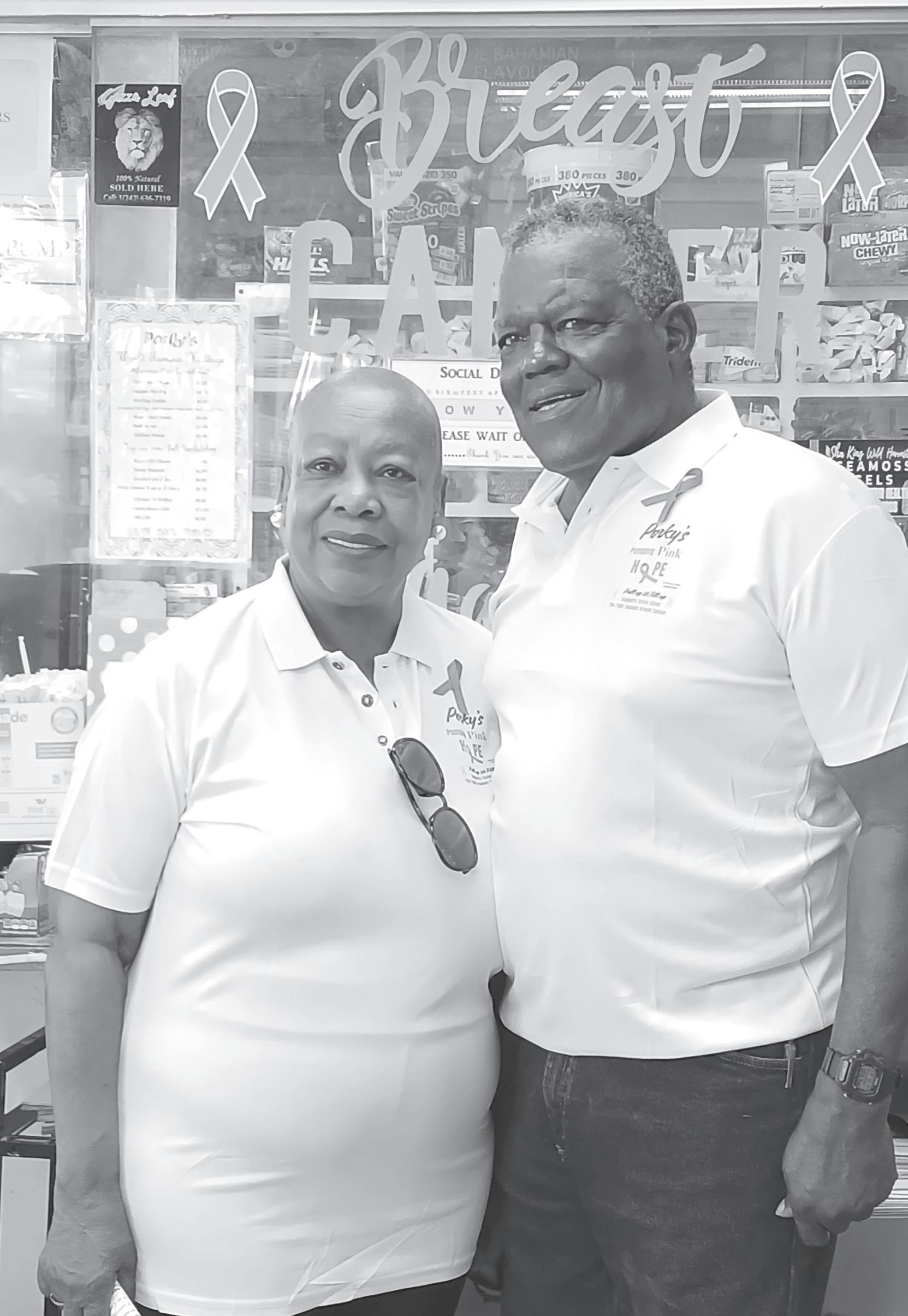

Thousands Walk for the Cure

STREETS across The Bahamas were filled with smiling faces, unwavering support, and stories of survival as thousands joined CIBC Caribbean for the region’s largest cancer awareness and fundraising event.
Walk for the Cure, which was held in New Providence, Grand Bahama, Abaco and Eleuthera, transformed communities into moving testaments of hope.
The annual event united survivors, families, friends, and supporters in one powerful stride against cancer.
CIBC Caribbean’s acting head of country Terrance Gibson said, “Walk for the Cure is a testament to what we can achieve when we walk together for a cause bigger than ourselves.
“Every participant, sponsor, and volunteer plays a role in supporting families and individuals affected by cancer. We are deeply grateful for the continued
outpouring of support that keeps this movement strong.”
Now in its fourteenth year, Walk for the Cure continues to stand as a beacon of solidarity across the Caribbean. Since its inception, the initiative has raised millions of dollars to fund treatment, care, and education programs for those affected by cancer.
All proceeds raised through Walk for the Cure in The Bahamas are donated to local cancer care organisations, including Sister Sister Breast Cancer Support Groups of New Providence and Grand Bahama, The Cancer Society of The Bahamas, The Cancer Association of Grand Bahama, and GD Sharing and Caring.
The 2025 event on October 4 saw an impressive turnout of corporate teams and sponsors including Platinum sponsor, CFAL, and local favourites such as BodineVictoria and Box Fit Nation.



By CARA HUNT Tribune Features Writer cbrennen@tribunemedia.net
IT’S Fall-time and while in The Bahamas we don’t have the falling of leaves to mark the season, as women we can use the idea of falling leaves to help us shed the things that are holding us back from our full potential.
Fall is a time of thanksgiving and harvest, but at the same time, it is also a time when trees shed their leaves as a precursor to winter. Using this imagery as a metaphor for life can
The joy of Fall
‘Sometimes, you just have to let go...’
help women use the autumn season as a period of transition, change and transformation.
“Sometimes, you have to just let things go, says Meghan.
“Sometimes there are things in your life which do not serve you and won’t help you in your relationship with God, your family and your friends and now is a great time to reflect on that and start letting things go.”
Anita agrees: “I love this season. I went to school in Canada and there is something so beautiful about the fall time. It just reminds me how
beautiful life is, but I think when you think about the season and compare it to your spiritual journey, I would say that sometimes things can appear really beautiful and you want it to stay forever, but you don’t know that a winter is coming and you need to be prepared.
“So Fall is a great time to reflect and recharge and say hey what do I need to do to prepare for any negativity that may be coming in my life.”
For Lynette, Fall is a time to start reflection on the past year.
“Fall is a time of year when people

start thinking about everything that they have to be grateful for and when you start thinking about what you have you realise that there are things that are just not important, but really you can just drop them because they are fluff and not valuable.”
And Maria says when she compares autumn leaves falling to her faith its about change.
“It’s about transformation, the tree sheds a piece of itself in preparation for the new season. you are one way today and one way the next but the tree still is beautiful in every season.”
25 years after landmark UN resolution, UN chief says women are too often absent from peace talks
By EDITH M LEDERER Associated Press
TWENTY-FIVE years after a landmark UN resolution demanded equal participation for women in all efforts to promote peace, the United Nations chief said on Tuesday that far too often women remain absent.
At the same time, sexual violence against women and girls is on the rise and 676 million women live within 50 kilometers (30 miles) of deadly conflicts, which the head of the UN women’s agency says is the highest number since the 1990s.
“Around the globe, we see troubling trends in military spending, more armed conflicts, and more shocking brutality against women and girls,” Secretary-General Antonio Guterres told a UN Security Council meeting marking the anniversary.
Since the resolution’s adoption on October 31, 2000, there has been some progress, he said. The number of women in uniform as UN peacekeepers has doubled, women have led local mediation, advanced justice for survivors of gender-based violence, and women’s organisations have been instrumental in promoting recovery from conflicts and reconciliation.
“But gains are fragile and – very worryingly – going in reverse,” Guterres said.
In no-nonsense language, Guterres said too often nations gather in rooms like the Security Council chamber “full of conviction and commitment”, but fall far short of the resolution’s demand for equal participation of women in peace negotiations — and protection of women and girls from rape and sexual abuse in conflicts.
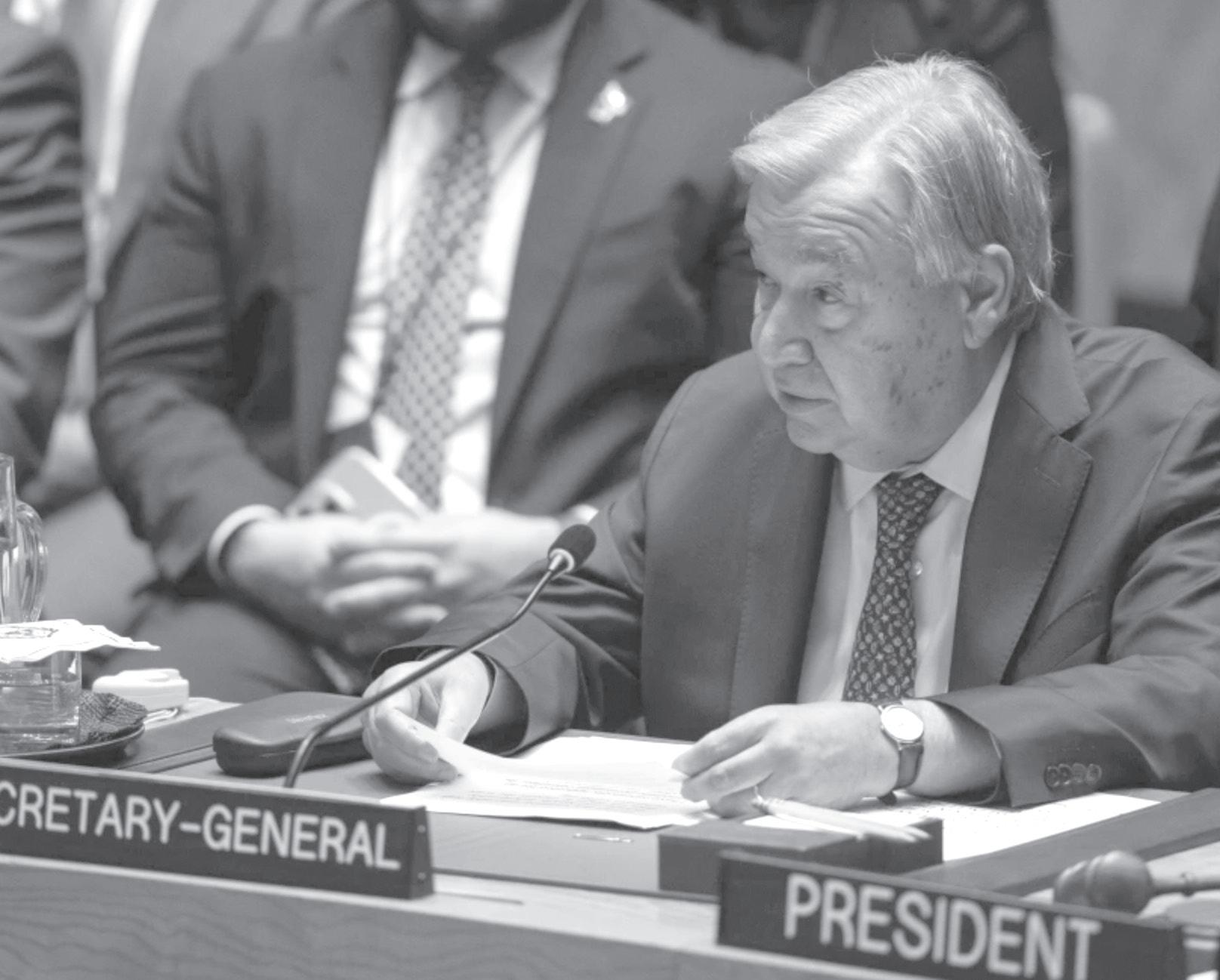
Despite the horrors of war, UN Women Executive Director Sima Bahous also pointed to some progress. She said women have reduced community violence in the disputed Abyei region between Sudan and South Sudan and in the Central African Republic. In Haiti, women have achieved near parity in the new provisional electoral council, and women’s representation in Chad’s National Assembly has doubled, she said. Syria’s interim constitution guarantees rights and protections for women, and in war-torn Ukraine women have succeeded in getting national relief efforts helping women codified into law.

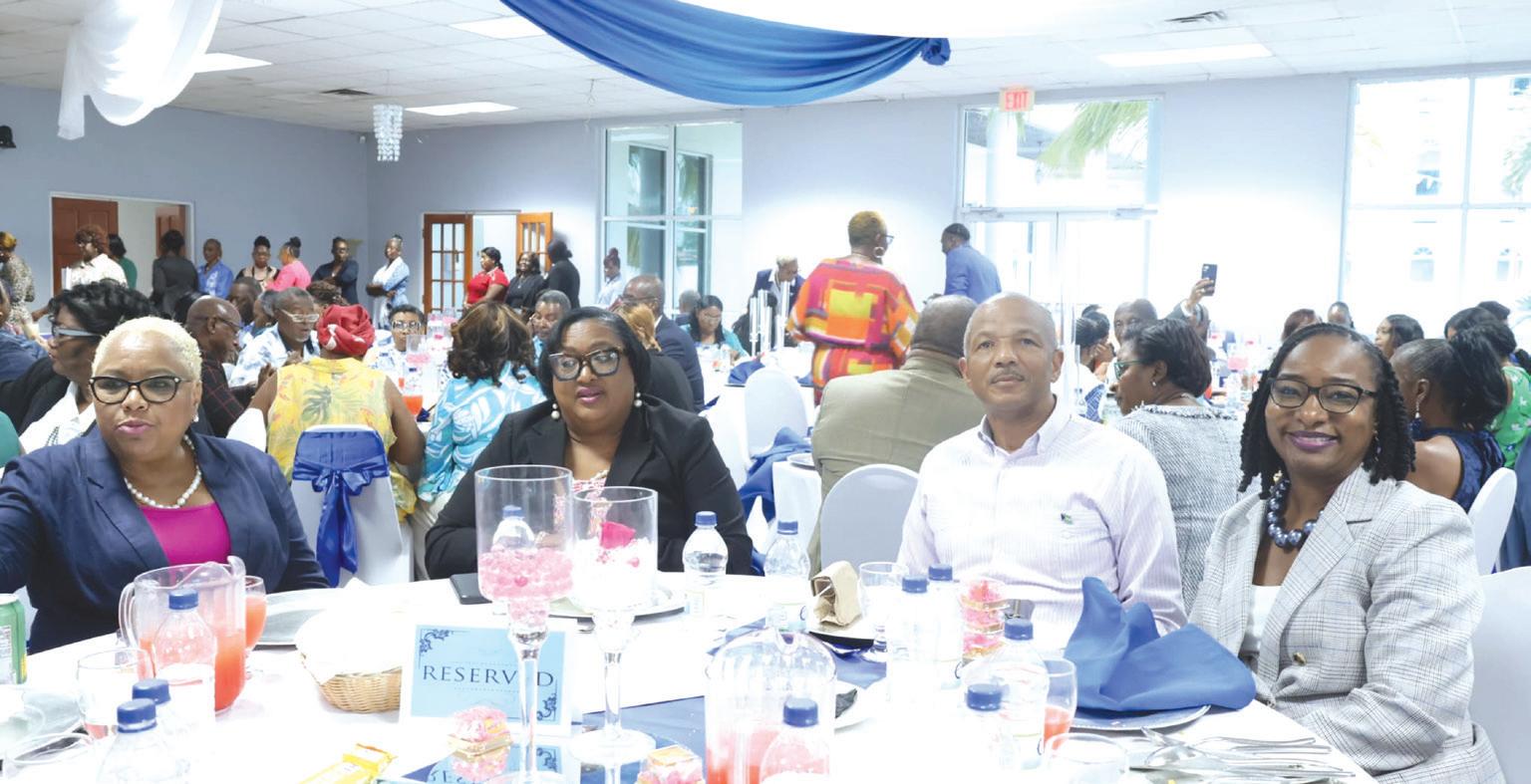
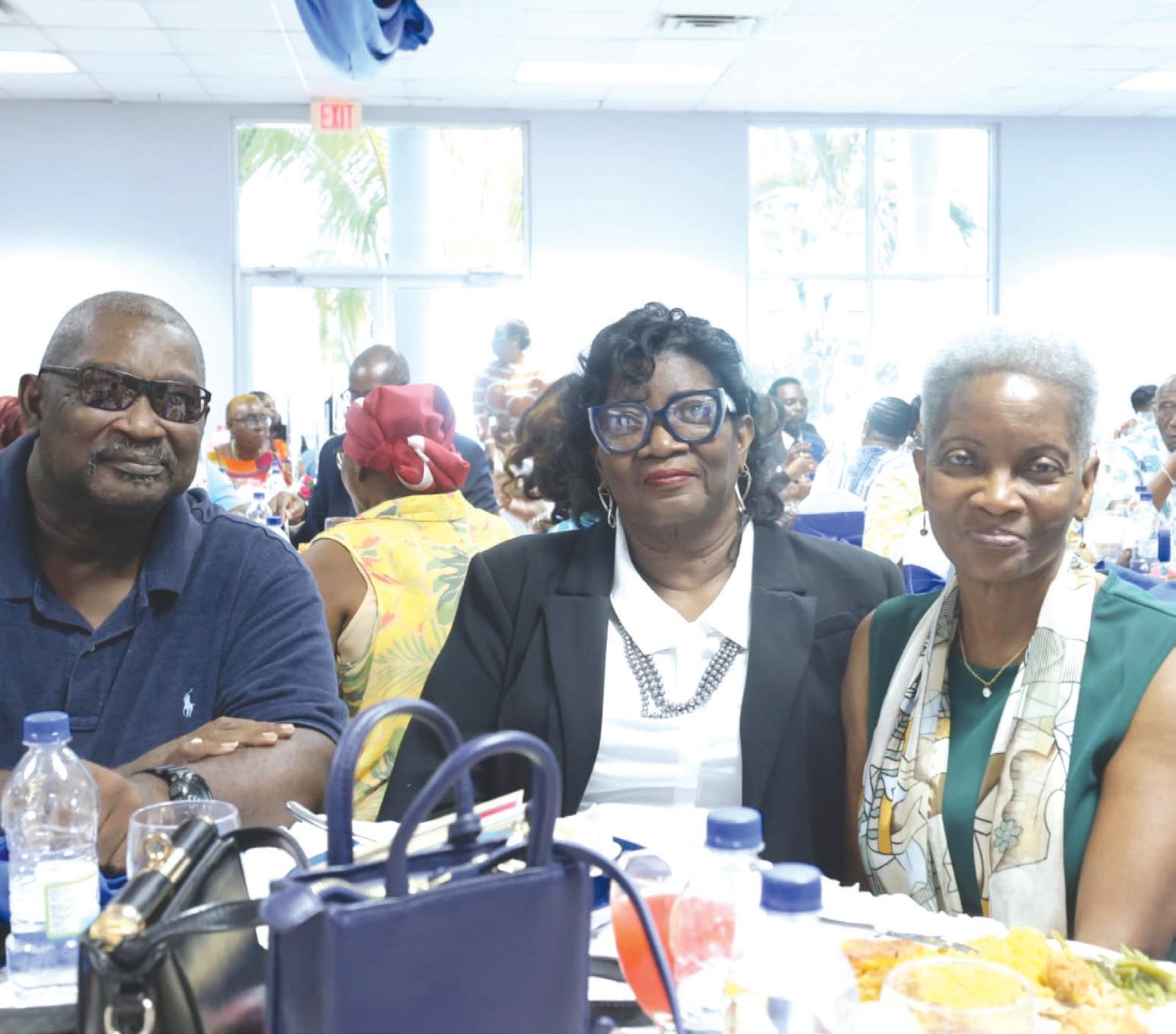
Honouring Charlamae
CHARLAMAE Fernander, former Director of Social Services, has retired. She was celebrated recently at a retirement appreciation luncheon hosted by the Ministry of Social Services, Information and Broadcasting.
Held at the Royal Bahamas Police Force Headquarters, the luncheon was an
opportunity for colleagues to connect and reflect on their time with the former director. Showered with gifts and gratitude, the ministry honoured Mrs Fernander’s nearly five decades of service to the Bahamian people - including her tenure in Grand Bahama during the aftermath of Hurricane Dorian and the COVID-19 pandemic.























































































































































MARINE FORECAST

































The Silk Walk Experience
By ALESHA CADET Tribune Features Reporter acadet@tribunemedia.net
FOR Chantel O’Brian, seeing The Silk Walk Experience come to life on the big screen was a memorable movement. After more than a year of hard work, the visionary behind the docu-film finally saw her labor of love unfold before an audience at a private screening held at the elegant Sapodilla Estate.
“To see The Silk Walk Experience Docu-Film come to life was truly a blessing.” said Chantel. To watch a process that began in July 2024 come alive on screen after more than a year of hard work was humbling beyond words for her.
“I felt an immense sense of gratitude, not just for the team who worked tirelessly behind the scenes, but also for the many creatives who filled the room that evening,” said Chantel.

She described the evening as a celebration of community, culture, and legacy. “Their presence was a reminder that this film went beyond fashion and that it was about community, culture, and legacy. What we know now is only the beginning, and seeing how far we’ve come gave me hope and reassurance that this vision is bigger than all of us,” said Chantel.
She extended heartfelt thanks to the private donors and partners who made the project possible, including the Tourism Development Corporation, Miller Designs, T Bastian Photography, Carey’s Fabrics, MJS Captured, National Art Gallery of The Bahamas, The Current and Eccho at Baha Mar, RAD Productions, Superior Productions, Jervin Munroe, Soralace Productions, Alfred Anderson Photography, Manje Da Griyo Shack, and A-List Productions.
Hosted by media personality Anastarcia Palacious, the event welcomed 200 specially invited guests, including key dignitaries and industry partners.
“The turnout was incredible. Among them were key dignitaries such as Acting Permanent Secretary of the Ministry of Tourism, Investments and Aviation, Lisa Adderley-Anderson; Pia T Glover-Rolle, Minister of Labour and the Public Service; Ian Ferguson, Executive Director of The Tourism Development Corporation; and Sandena Neely, Head of the Youth Division at the Ministry of Youth, Sports and Culture. Also present were many of our valued partners and sponsors,” said Chantel.
What stood out most was the audience’s emotional response. Chantel said there was laughter, moments of awe, and even a standing ovation. People didn’t just watch the film; they felt it.
The film’s impact, she said, was equally profound for the designers and models featured in it.
“The response was nothing short of beautiful. For many of the designers and models, this was the first time their stories and craft were captured in such a
cinematic and respectful way.
“We made it a point to honour them. Each creative who attended was presented with flowers, a symbol of our gratitude. I could see in their eyes how much it meant to have their artistry taken seriously and delicately presented to the world,” said Chantel.
Since the screening, feedback has poured in from near and far. Locally, Chantel said people expressed how proud they were to see something of this magnitude created right here in The Bahamas; something many said they had never experienced before.
“Internationally, we’ve had supporters and global creatives send words of encouragement, noting that this project is exactly what the Caribbean and the fashion film industry need,” she said.
And as for what’s next, Chantel is already thinking globally. She said the private screening was just the first step.
“With the expertise of our production team T & T Media, and producer Kerel Pinder, we were able to craft a film that speaks to anyone; whether you’re a Bahamian, a creative, or someone in need of inspiration to keep pursuing your passion.
The reaction we received confirms that this story is not just local, but global. This is the kind of film that deserves to travel, and we’re committed to making sure it does,” she said.
Looking ahead, this creative businesswoman hopes to take The Silk Walk Experience even further. The next step is to push toward a public screening and secure opportunities to showcase the film on the international festival circuit.
”To get there, we’re calling on our community and supporters near and far to rally with us. A film of this capacity took significant resources and dedication, and for it to go further, we need continued support. That’s why we’ve launched crowdfunding at thesilkwalkexperience. com, where anyone can learn more and contribute to its success,” said Chantel.
Ultimately, she believes The Silk Walk Experience is helping redefine the conversation around Bahamian fashion - by showing that local designers, creatives and models can stand on any global stage with excellence and originality.
When asked what theme song best captures the spirit of The Silk Walk Experience, Chantel said from the beginning, music was a critical part of shaping the soul of this film.
“We worked with Bahamian composer Antonio Dean of A-List Productions, who created an original score that fused culture, rhythm, and inspiration into every runway sequence.
The music became its own character in the film, it was Bahamian at its core, yet universal in its ability to move people. So while I can’t choose just one existing song, I would say the true theme song of The Silk Walk Experience is the score itself: cultural, inspiring, and unapologetically Bahamian,” said Chantel.



